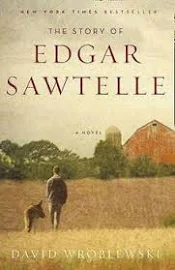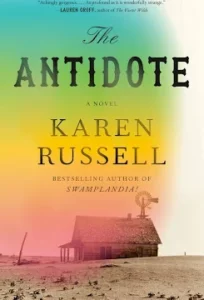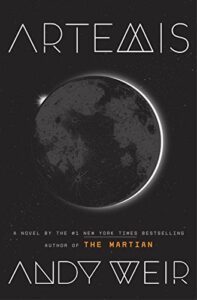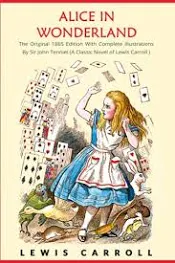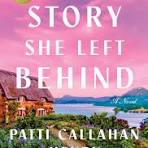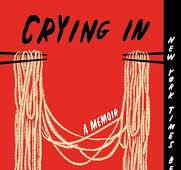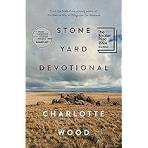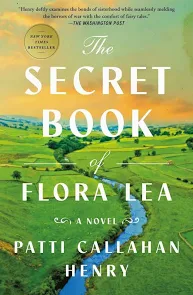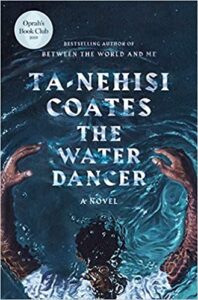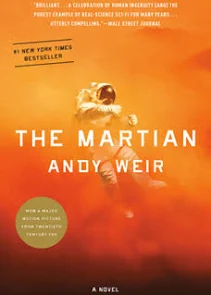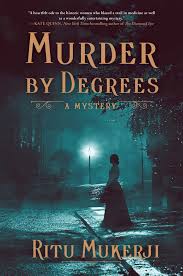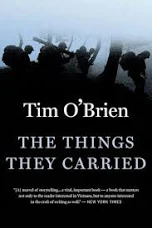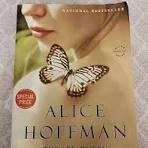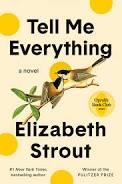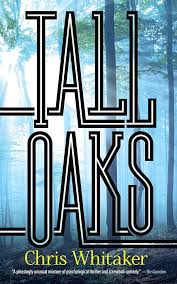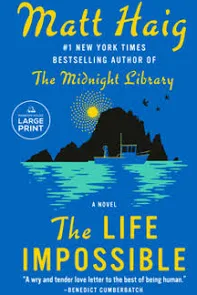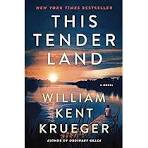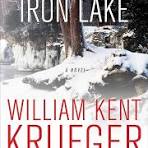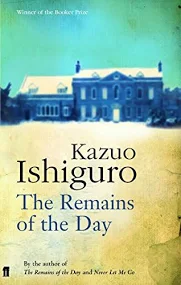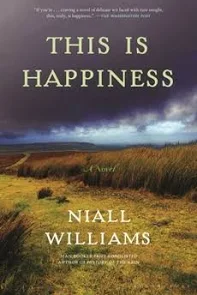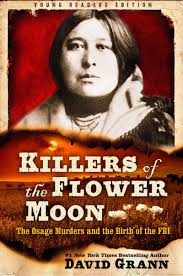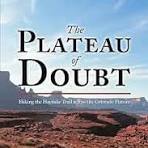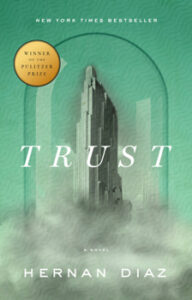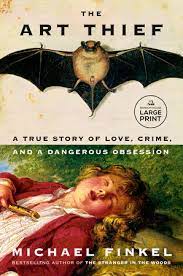Dusty Shelves Book Blog
David Wroblewski
Fiction 2008| 562 pages
![]()
First, to begin, I wouldn't call this a novel ... but a saga or an epic. It is very long, very detailed, with much depth. Yes, our main character Edgar is born mute, and it IS his story as our primary point of view throughout, but yet, I don't see his perspective, ability, and disability, as the focus of the book. The tragic story about the family plays out against the backdrop of the breeding of Sawtelle dogs. If you don't love dogs, I cannot see how you would love this book.
Edgar's grandfather began the breeding program for a fictional dog breed many years ago. Our current date in the telling of this story is various years in the early 1970's. The kennels are on a farm in Northern rural Wisconsin. It gives a very visual picture of the rural Midwest at this time, small town happenings and all.
Of course, it isn't only about breeding and training a new dog breed. Edgar's father is Gar, and Gar's brother is Claude. Claude has been away from the farm for 20 years when the novel begins, but he returns, with much of his kenneling knowledge intact. And thus begins the mystery, the tragedy, the deep sorrow in The Story of Edgar Sawtelle
I believe the writing is extraordinary. The characters, the essence of the story, the depth. There is some minor and delightful magical realism that augments the tale. Some reviewers argue that Wroblewski doesn't explain adequately why characters do things. Why did Edgar run away ... really? Why does he show the dogs to the man from Austin in the manner he does? I am wondering if patience is the needed trait as a reader? Your imagination must fill in the gaps, and yet the story line runs true and clear.
My one criticism is it could be better edited. There are sentences and sections that repeat pretty close to verbatim, and a good editor should have caught these.
I must recommend this saga. It may not fit everyone's taste, but it is worth a try. Just know that you will be reading for a long time. It is a compelling saga ... almost a compulsive read. I never for a moment thought about not completing yet. And yet, it is quite a challenging read. I would love to hear from anyone who has read it or chooses to read it now.
July 2025
Patti Callahan Henry
Fiction 2017/ 326 pages
![]()
This book is very relational, very emotional, very much about self-discovery, self-awareness and insight. It actually was too much of all this for me. There was not enough plot or action moving life forward.
The Bookshop at Water's End is about two life-long friends, Lainey and Bonny, who spent their summers in high school in Bonny's house/cottage in Water's End, Florida. Known as the Summer Sisters, they were inseparable, as they, besides hanging out in the ocean and the river, attempted to replicate Nancy Drew mysteries in their small town.
20 years later, the two women are facing professional and romantic crises in their lives, and return to the house, their children in tow, to find a sense of groundedness, to find their older selves, to determine what is next in their lives. These two women are extremely close and they know everything ... almost ... about each other. The closeness becomes, what is the word I want, somewhat suffocating for me.
Lainey's mom left this house decades ago, never to be heard from again. But Lainey has spent these many years searching and hoping. Yes, the mystery of her mother Clara is eventually revealed.
I really enjoyed Piper, who is 17, I think, and Bonny's daughter, and struggles with the angst of being a teenage who never feels adequate. I found her to be the most in-depth and interesting character.
I was disappointed that neither Mimi's bookshop nor books in general play as strong of a role as I think they could have. One Good-read's reviewer called this book a "Nice read" and I think that is accurate. It is easy to read. It is not challenging, but also not memorable. If you need a beach read, this could suffice.
June 2025
Haruki Mirakami | Fiction
1994, 607 pages
![]()
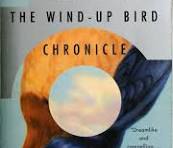
In the first 100 pages all that happens is Toru Okada searches for the missing cat. He does find an abandoned house, an abandoned well, and an abandoned alley. And we get hints that there are problems in his marriage, but so far, there is no plot.
I managed 252 pages of this 607-page book. I can't read a page without falling asleep. Mr. Okada meets people and tells their stories, and some of the stories are interesting and some are boring but I can find no plot and no compelling reason to read on.
I know people who really liked this book, but I cannot recommend it myself.
June 2025
Karen Russell
Fiction 2025/ 419 pages
![]()
A change in perspective is often useful. I was calling this book boring and then decided to read a few reviews to see if I was alone. Many people loved it, and a few reviewed is as “slow-moving.” This helped a lot! Once I saw it as slow-moving it became less boring. I was ready to accept it for what it is. Four days into reading The Antidote, we were just a week from the book’s instigating event, the Black Sunday Dust Bowl in Uz Nebraska, on April 14, 1935.
Asphodel Oletsky, also known as Del, in the primary character, I believe, though some feel Antonia Rossi, also known as The Prairie Witch, or The Antidote, is the main character. Not important who is correct … but clearly there are at least two critical women characters.
We begin with vivid descriptions of the unimaginable dust in the Dust Bowl, where you could be right outside your house and not see it, due to blowing dust. The dust destroys everything … homes, animals, and especially, land and crops. How are the people of Uz (and all of Nebraska?) supposed to survive? There are multiple stories that progress through the book.
Del lives with her uncle Harp Oletsky, after her mother was murdered. One of the story lines in The Antidote is about the discovery of her murderer. A young ne’er-do-well man is accused of seven murders, including Lada, Del’s mother. But then his execution is botched, just in time to learn that the cruel and corrupt Sheriff fabricated evidence.
Del becomes connected to a Prairie Witch. Prairie Witches are the primary manifestation of magical realism in the book. The role of Prairie Witches (or Vaults) is to hear the memories people most need to forget, and to “store” them for the client. People walk out of a session with a Prairie Witch, being greatly relieved to be freed of their memory, which they truthfully no longer remember. They can return any time and recapture the memory (except the Prairie Witch typically loses track of the memories and has to make one up.). Del apprentices to the Prairie Witch.
Through the book, the Prairie Witch reveals more and more about her life story, the center of which is having her newborn son taken from her without her permission at a barbaric “home for unwed mothers.” …. A sign of the times.
We watch Harp, Del’s uncle, change from a gruff unfeeling man to a tender soul. There is much imbued in his story about how his family immigrated from Poland and how unfair and unwise it was, he sees now, to kick all the Natives off the land and attempt to farm it themselves, as white people from other countries and geographies.
Del is Captain of her high-school age basketball team. The team are fast friends and often play deep into the night. I think the author never played basketball. She manages to play the numerous scenes out with no heart, no real sense of play or joy or realty. Basketball is my favorite sport. I played intramural for six years, and somehow the author, Russell, is unable to capture the soul of girl’s basketball.
One of my two favorite characters is Cleo Allfrey. Cleo is a Black photographer hired by the government to go out west and take pictures of the people living in the deep Midwest, their lifestyle, how they earn a living and govern themselves. Unfortunately, Cleo’s boss does not like her photographs. They are not sanitized enough. They show real people with real emotions doing real things. He wants only happy White people. He has a hole punch and we see many of her photographs with a hole punched through the face of a mother holding her baby, or a woman hugging her sister over a basket of food they harvested. I found the holes punch in these photographs exceedingly sad. Cleo eventually finds an old accordion camera, which leads to the book’s denouement. Her camera takes photographs of the world around her. But when they develop, they show scenes in the photograph of past and future events. Another interesting piece of magical realism.
My other favorite minor character is the Scarecrow, who stands ever secure in his field, and occasionally has one-or two-paragraph chapters as he wisely communicates what he sees in the world.
Karen Russell’s prose is excellent. The Antidote reads almost in real time. Slow, in depth, rich. This book will not grab you by your emotions and pull you in. You must just decide to commit to it. I am glad I did and I can finally now recommend it.
June 2025
Charles Graeber
Nonfiction 2018| 302 pages
![]()
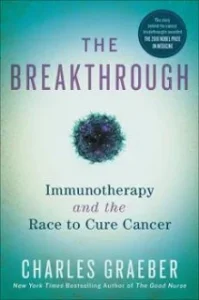
No one on my blog list will likely read this book. For probably the first time in Dusty Shelves, I am including the title and subtitle: The Breakthrough: Immunotherapy and the Race to Cure Cancer. While this book was recommended to me, I was disappointed to learn it was published in 2018 which means it was written about 2016, and so is nine years out of date.
Nevertheless, I learned a great deal about the history of immunotherapy. How physicians first tried to infect other viruses, diseases, and bacteria into non-responsive cancer patients in the late 1880s to entice the body to supercharge its immune system and fight the non-self cells of cancer. Though wildly unsuccessful, the germ of a good idea was inoculated (so to speak!)
I learned about T cells, B cells, and the all-important anti-CTLA-4 ipilimumab. Performance status, checkpoint inhibitors, pigs, mice, and TNF (tumor necrosis factor) were all concepts I learned. The role of T cell research and application with AIDS patients is imperative.. All of these are important to and informative of today's medical oncology use of immunotherapy.
I rated this two hearts because it is likely a very obscure topic for most of you. However, it is written with the lay person as its audience, making it readable and typically easy to understand.
June 2025
Any Weir
Fiction 2017/ 305 pages
![]()
Jazz Bashara was born in Saudi Arabia, but emigrated to the moon colony of Artemis with her father when she was six. Intelligent, strong, opinionated, resourceful, intense, nuanced, naughty, and irreverent, (I like her!!) at 26, Jazz earns her meager wages mostly by smuggling for the rich on Artemis. She is also an excellent welder, having been taught by her father, the best welder on Artemis.
It is interesting to learn how Artemis is setup (a good map is included in the book) with pods and domes and management of air, food, transportation, energy, laws. It makes me think and wonder ... how would I design a city in a hostile geographic environment?
Jazz and her friends (she has quite a few) are fascinating to watch, and I find her character to be well developed and intriguing. It is fun to watch the tourists come for a vacation and experience gravity at 1/6th of earth.
She becomes involved ... no, more, she takes the lead, in a major corporate criminal action designed to reallocate power and resources in Artemis. Is the civil disobedience worth it? I don't know . All's well that ends well!
My major objection is, like in The Martian, Weir gets too technical and too scientific for me. In Artemis, I did not understand anything that happened between pages 220 and 280, where Jazz is orchestrating her crime. Someone geekier than me, more educated, or more intrigued by the workings of air systems and valves, rovers, chemicals, EVA's and welding may feel this is quite a great section!
I liked The Martian a bit better than Artemis. Though in Artemis, there is more context-setting, and more interaction with other parts of the system and other characters, The Martian gives us technical challenges spread throughout the book, and each is vastly different, part of what holds my interest.
In Artemis, there is but one significant technological challenge, and it all occurs in the above-mentioned pages.
I must recommend this with various grains of salt!
June 2025
Lewis Carroll
Fiction 1865| 101 pages, and
Fiction 1871| 126 pages
![]()
A few weeks ago, we went to the Central Oregon's School of Ballet performance of Alice in Wonderland. It was so well done! And the costumes are the best I have seen in a local performance. Spectacular! The director came out and spoke at intermission and admonished the children in the audience (of which there were many) now that they had seen the ballet, to read the books. I thought it was a great idea!
There are memes I recall easily ... the White Rabbit, the Cheshire Cat, and "one pill makes you larger and one makes you small and the ones that mother gives you don't do anything at all."
So much I have long forgotten over these sixty years or so since I last read these books, about puppies and thistles and a Dodo; and cucumber frames, hookahs, gryphons and juries; Tweedledum and Tweedledee. Carroll's writing is amazing! So much great dialogue, and never-ending creativity, while we root for Alice whether she is having a delightful experience at this moment, or when things are not going so well.
I didn't like Through the Looking Glass nearly as well as Alice's Adventures in Wonderland, but the only copy I could get is an audiobook, and I am NOT a fan of audiobooks. I just can't focus. So take that comment with a grain of salt!
We went to a neighborhood gathering last night, and I mentioned I was reading these books when the conversation turned to "what have you been reading?" One of my conversation partners said she taught these books to her 4th and 5th graders when she was a teacher. She said there are significant political undertones and messages. I decided I didn't want to know about those!
How great to reread these creative books. I recommend doing this with many/any books we read decades ago!
June 2025
Patti Callahan Henry
Fiction 2025 | 352 pages
![]()
Another novel by Patti Callahan Henry with a book as a main character! I am not certain if I enjoyed The Story She Left Behind more or less than The Secret Book of Flora Lea. (See my earlier book review). But Henry has a least one more novel of her 34 published books with a book in a central character role, The Bookshop at Water's End, and it is on its way to me.
Context: In The Story She Left Behind, we learn about Bronwyn Newcastle Fordham, who was a child prodigy. She writes a highly successful book, The Middle Place, at eight years old, and it is published when she is 12. We pick up her story years later when a family crisis causes her to abandon her daughter Clara and her husband Timothy when Clara is an impressionable 8-year-old. And then we move forward another 25 years, to Clara's adulthood.
Fast forward. Clara is living with her own 8-year old daughter Winnie, in South Carolina. (Yes, the author does seem a bit obsessed with eight-year-old girls). She receives a phone call from Charlie, a man in England, unknown to her, who tells her he has found a satchel among his recently deceased father's belongings. The worn satchel includes a sealed letter to Clara Harrington along with many pages relating to Bronwyn's sequel. Somehow, this man has vital information about the second book, that her mother penned after The Middle Place. The sequel is written in an invented language, which is absolutely intriguing and inspired me to create an invented word!
Clara and Winnie board a steamer for London (the year is 1952) and our story unfolds as we discover how these families in South Carolina and England, who never heard of each other, are inextricably intertwined. All of this raises hope in Clara that her mother is still alive.
The story is delightful and filled with intrigue, visual acuity, love, loss, mystery, the power of story, the role of make-believe, and romance. Interesting twists and occurrences happen, such as the Great Smog in London, which threatens Winnie's health and their safety. And their discovery that The Middle Place has been turned into a play.
I highly recommend The Story She Left Behind. It is an easy and delightful page turner.
May 2025
Michelle Zauner
Nonfiction Memoir 2022 / 239 pages
![]()
I call this a "tender" book. It is about a biracial Korean American young woman and her relationship with her mother, Chongmi. Her relationship is beautiful ... even though mother and daughter do not share their values completely. Michelle's mother is much more focused on her daughter’s beauty than Michelle is herself, for example. And yes, there are conflicts and stress when she is a teenager, but what woman did not have a challenging time with her mother in those years? This part of the story is bookended by a loving, tender and respectful relationship between mom and daughter.
Both when Michelle is little and when she comes home to Eugene Oregon at 25 and finds her mother has been diagnosed with pancreatic cancer, she works hard to establish and keep a relationship with Chongmi. This non-fiction story focuses shamelessly and without hesitation on the pain and sorrow of watching your mother deteriorate and die and tells us the gripping-ly honest story of her and her father's grief. It is powerful in its honesty.
The thread of the book, however, is food. Michelle and her mom relate through Korean food all their lives, as they search for authentic ingredients when living in Eugene, and Chongmi attempts to teach Michelle how to cook tasty Korean food, and they share an inordinate number of meals, both in Eugene, and during the summers they spend is Seoul. There is considerable description of food, how it is prepared, what good, fresh ingredients are. I did not truly understand a bit of this, as all the food they eat, I have never eaten! Sheltered cuisine life, I guess!
I gave it three hearts because if what feels to me Iike filler. Michelle writes a lot about her days in college, as a struggling musician, and as a new entrant into the workforce. But these do not seem to matter much to the central theme of Chongmi’s death and Michelle’s subsequent loss. But Ms. Zauner is telling her own story, and I suspect she believes these years impacted her latter years with her mom in a way I do not understand.
Crying in H-Mart is definitely worth a read, for the insight you may gain into both Korean-American culture and the intimate processes of death.
This book is one of the GoodReads books of the year, 2021.
May 2025
Charlotte Wood
Fiction 2023 / 293 pages
![]()
I am a fully-recovered Catholic. Yet this book brings me back to some of the joyous moments of my youth as a Catholic, and 12 years of Catholic school.
During my time in my all-women high school, we had two or three retreats in the convent where the nuns lived. It was a spacious, beautiful, modern building with lots of couches, chapels, prayer rooms, individual small bedrooms. And staying there was incredibly peaceful and meditative (and prayerful).
In my first year in college, my roommate and I took a class on Community, and we spent a weekend in the convent where the Franciscan nuns who taught at my grade school lived, for our class project. Though older and more worn, the wooden building had an aura of peace about it and the nuns embraced us with love, gentleness, and tranquil calm. I still recall there was a lot of laughter.
Stone Yard Devotional is an unusual book, making this a difficult review to write. The narrator, whose name we never learn, abandons her life and work as an environmentalist in Sydney, and also leaves her failed marriage, to spend a few days on a very remote piece of land in a small convent, just outside the town where the narrator grew up. She goes for the peace and quiet, and for the meditation (though the nuns call it prayer). On her last visit, she simply never leaves.
She never becomes a nun and is not religious. There’s no great conversion moment, no sense of redemption; it is just women getting on with things. This probably does not sound like the most spine-tingling premise for a book, and it is not. There is no plot as such, but Charlotte Wood's prose is very thoughtful and spiritual. She writes in a slow, contemplative pace.
No plot doesn't mean nothing happens. There is the return of the bones of a nun who used to live in this abbey and was murdered 30 years ago. The bones are accompanied by another nun, whom the narrator went to school with. This other nun, Helen, is a loner who seeks the limelight, a woman who was psychologically damaged in her youth and cannot really relate to anyone.
And then there are the mice.
The mouse plague is horrendous, disgusting, turn-your-stomach-ill. Mice have taken control, both indoors and outdoors, multiplying overnight, every night, and eating their food, wiring, and furniture. And dying and smelling. These religious women have to figure out how to come to terms with the killing they must do. Page 147: "We wore latex gloves and surgical masks. A macabre job: the smell, the soft bodies tumbling by the shovel load. I closed my eyes as I pushed the shovel into the pile." Poking around to learn more about this book and the author, I discover that the mice represent the Covid 19 plague. Yes, it all makes sense, while being repulsive.
Stone Yard Devotional an introspective meditation on guilt, the nature of forgiveness, prayer, being in community, unresolved grief, relationships, personal peace and presence, and how to live in the world.
I cannot give this book a whole-hearted endorsement. You must be someone who is in the mood for something that is not compelling, but meditative. Neither can I not recommend it. I am glad I read it. I have a sense of peace, having read Stone Yard Devotional. As long as I don't see a mouse scurrying across my kitchen floor.
I am co-reading this with my friend Mary. I look forward to hearing what she has to say. (I know her from that same all-women Catholic high school, mentioned in my second paragraph).
May 2025
Colum McCann
Fiction 2009| 350 pages
![]()
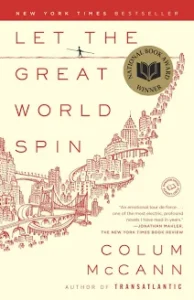 The through-line in this novel is delightful! Periodically we see our focus ... a tightrope walker who strings a cable between the top floors of the Twin Towers (back when they still stood) and walks, dances, and hops back and forth between the buildings. (A true story from August 7, 1974). Sadly, this delightful story is only about 50 pages of the book.
The through-line in this novel is delightful! Periodically we see our focus ... a tightrope walker who strings a cable between the top floors of the Twin Towers (back when they still stood) and walks, dances, and hops back and forth between the buildings. (A true story from August 7, 1974). Sadly, this delightful story is only about 50 pages of the book.
The rest of the novel is about various people who watch him, or hear about him, or know someone who was watching him. I have no problem with this format. It is clear who the people are, and McCann does a good job of bringing them together, with characters and relatives of characters appearing and reappearing in a variety of vignettes. And his writing is superb; beautiful in fact.
So, why is this a two-heart book? What I really dislike about this book is the content itself. Nearly all of the vignettes are depressing and include violence and sometimes death. All of them are connected in some way to sex workers, which in and of itself is not depressing, however, he represents the poorest of the poor, the addicted, the depressed, the sad, the downtrodden people and buildings in NYC. The novel is gritty, challenging, and often desperate. Too much grit for me right now.
This is our book club book for this month, so I reserve the right to change/shift my mind after our discussion! In the meantime, I suggest you look elsewhere.
May 2025
Patti Callahan Henry
Fiction 2023 | 350 pages
![]()
"Not very long ago and not very far away, there was and still is an invisible place right here with us."
On the last day, in the last hour, of her 15-year job at Hogan's Rare Book Shoppe in Bloomsbury, England, Hazel Linden opens a package that was mailed to the store, and in it she finds a first edition and original illustrations of a book that takes her breath away and is about to change her life. The title: Whisperwood and the River of Stars by Peggy Andrews (whoever she is!) The Secret Book of Flora Lea is, in some way, reminiscent of The Echo of Old Books (see Dusty Shelves, September 2024).
Hazel knows the quote above, and all about Whisperwood, because it is her story, from her imagination shared only with her sister Flora. She started each tale about Whipserwood with these words, and Henry starts this book with the same words.
Hazel (14) and Flora (6) were "vaccies." They were sent away to a temporary home that was far away from London to keep them safe from dropping bombs in 1939. They were fortunate; they ended up in a home with a mom who loved them, and a “brother” named Harry. Their real mom visited them often, and they stayed safe from much devastation and death in London.
But one day her little sister Flora disappears and isn’t seen again. The police think she drowned in the river, but her body is never found. The time in this book travels between 1939 and 1960. So we see Hazel and Flora during the war, and we see Hazel (the main character) in 1960, having found this book that tells the story that she made up and no one knows about except Flora.
So, of course, the essential question is, “Is Flora sill alive? Did she write this book?” And that’s what we witness as we read this tale, which the author calls historical fiction because of the truth around the evacuees and children who become lost. We witness her search for the answers, while we experience the love she still holds for her younger sister.
I LOVED this book! The story; the development of Hazel as a character; the intrigue in finding the answer to “Is Flora dead?”; as well as excellent and engaging writing all combine to make it a page turner. I may suggest it for book club next year.
I absolutely recommend reading The Secret Book of Flora Lea. The author has written 20 books. I just requested her last book, which has only been out six weeks, at the library, If you have read any of her straight fiction or her historical fiction, please let us know in the comments section!
May 2025
Ellen Raskin
Fiction 1978| 182 pages
![]()

Sixteen people are invited to live in an apartment building north of Chicago. One of them allegedly murders the owner of the building. The owner’s will invites them all into a game, with clues, because he knows who is going to kill him. Whoever discovers the murderer inherits his $200,000,000 estate.
I read some five-star reviews so I could understand why anyone LIKED this book! Adults are writing reviews, so much of it was nostalgia for their youth, and it brought back memories. I thought it was one of the poorest written books I have ever read, even trying to accommodate for the YA audience. Too many characters, all of them stereotypes, cliche and shallow. Each character was just glossed over, and even though they were described in a basic way, there was nothing to really draw me in or make me care about them. Everyone, including me, loved Turtle, however. She was the only character with any development; she is the exception. She is 13 years old for most of the book. In the end, she acts as the lawyer who tries the alleged murder case. I can see why a young reader might remember Turtle well into adulthood.
Not an uninteresting plot, but I thought the search for the culprit was more interesting than the conclusion. I did not have difficulty reading it, just thought it wasn’t any good.
My friend Mary and I read this book together. It is one from the Goodread’s 100 books list (one for each of the last 100 years). Some of Mary’s words are in this review. Neither one of us will be recommending this book to you or anyone else!
April 2025
Ta-Nehisi Coates
Fiction 2019 | 402 pages
![]()
I was intrigued to read how the enslaved Black man Hiram Walker refers to the land-owners as "Quality." Slaves are "Tasked." "Low" refers to low-class whites. Those sent down to be sold are “gone Natchez-way.” The novel explores the dehumanizing effects of slavery, focusing on the emotional and psychological toll it takes on individuals and communities.
We begin when Hiram is still a child and follow him into adulthood. He is so brilliant, so real, so aware and conscientious, that he is brought to his white enslaver's home, the home of Howell Walker, to care for the house and his idiot of a son Maynard, through his white wife. Though both Hiram and Maynard are sons of Howell, Hiram is the son of one of Howell's slaves, Rose.
In The Water Dancer‘s opening pages, Rose returns ... this time as a phantasy figure on a stone bridge, her hips dipping and swaying to invisible music, an earthen jug “fixed on her head like a crown.” Hiram has no memory of her or the day she was taken away ... which pains him ... but does see her magic. Hiram has two supernatural powers. He has a literal perfect memory, and he has the gift of Black magical realism, a supernatural gift of travel through space and time, which allows him to remember the past and alter the present.
It is easy to get lost in Coates' lush language. The story pulls you in and along. As Hiram runs from the Walker home, he encounters many trials but is ultimately connected with the Underground. For all I thought I knew about the Underground, The Water Dancer taught me so much more. I have greater perspective and knowledge about how the Underground extensively planned for those they helped transition from slave to free man. A slave did not just run to a certain place and wave a flag and be transported.
Hiram Walker is recruited into the Underground and uses his powerful memory and begins to understand how to harness his other, more mystical, powers and put them to good use. And that good use involves escaping from slavery and helping others, through challenge and triumph, to do so as well.
Coates’ characters are rich and deep. I particularly like that he can write female and male characters with equal insight. There are many powerful women in this book, including some who are buried deep in slave-owner families who, following their truth and heart, are invisible abolitionists. Some reviewers were put off by the magical realism. I was not. It added a layer to this story that would have rendered it incomplete if it was left out.
This is not an easy read, nor a quick one, but it is a novel that will stay with you, and make you think, and I do surely recommend it.
April 2025
Andy Weir
Fiction 2011 / 376 pages
![]()
When a freak dust storm brings a six-person 31-day mission to Mars to an unexpected close, an astronaut who is left behind fights to stay alive. One minute, astronaut Mark Watney was with his crew, struggling to make it out of the deadly Martian dust storm and back to the ship, currently in orbit over Mars. The next minute, he was gone, blown away, with an antenna sticking out of his side. The crew knew he'd lost pressure in his suit, and they'd seen his biosigns go flat. In grave danger themselves, they made an agonizing but logical decision: Figuring Mark was dead, they took off and headed back to Earth.
As it happens, though, Mark is very much alive. He wakes up some time later to find himself stranded on Mars with a limited supply of food and no way to communicate with Earth or his fellow astronauts. And he is not ready to give up! Luckily, Mark is a botanist and a mechanical engineer as well as an astronaut. So, armed with a few potatoes, he becomes Mars' first ever farmer. And the person person to live alone on the planet. And the longest living human on Mars, hundreds of "sols" longer than anyone else (a "sol" is a Martian day, which is 39 minutes longer than an earth day). Mark must overcome a series of increasingly tricky mental, physical, emotional, and technical challenges just to stay alive, until finally, he realizes there is just a glimmer of hope that he may actually be rescued. (I stole this review quite liberally from a Goodreads reviewer. She did such a fine job!)
While Weir writes to the lay audience, I still found the technical details of CO2, hydrazine, airlocks, water reclaimers, electrical connections, RTGs, rovers, fuel plant compressors, a Hab, and many tools, mathematical equations, hypotheses, and test-runs a little overwhelming intellectually. Still, the author’s ingenuity in finding new scrapes to put Mark in, not to mention the ingenuity in finding ways out of said scrapes, is impressive.
But the technical story is interspersed with the human side, as we learn what is happening at NASA, especially when a low-level staffer, Mindy Parks, discovers that Mark is still alive, shortly after his funeral.
Mark Watney is not only brilliant, he is also an amazing optimist, and unwaveringly funny. His humor contributes significantly to the pleasure of this book and often cuts the tension. It is also an essential component of his survival and makes him easy to relate to.
Andy Weir did a great job with his first novel, which was actually created chapter by chapter on his blog. And then it sold for a movie! Good job, Mr. Weir! Yes, I recommend The Martian.
This is on the Goodreads list, top rating, for 2011.
April 2025
Dorothy Sayers | Fiction
1935, 544 pages
![]()
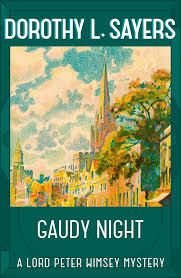
This book begins with our main character, Harriet Vine, attending Gaudy Night, which is a weekend gathering at her former college. All that occurs is conversation after conversation with other women in attendance, some of whom Harriet remembers, and some whom she does not. It is as exciting as any conversation at a school reunion ... NOT. But then, at the end of Chapter 3, something occurs to entice us into thinking that there really will be a mystery to be solved, and some tension begins to build.
Reviewers say it is best to read the Harriet Vine books in order:
- Strong Poison (1930)
- Have His Carcase (1932)
- Gaudy Night (1935)
- Busman's Honeymoon (1937) (As Lady Peter Wimsey)
Had I read these in order, this may have helped me not confuse Peter Wimsey, Harriet's co-investigator into crimes, with Phillip Boyes, Harriet's ex-lover, whom she was accused (and acquitted) of murdering with arsenic.
I made it to chapter four, but that is all I could abide. I don't recommend Gaudy Night, but then, if you read this series in order, you might enjoy it.
(I am reading some books from a delightful list ... the highest rated books by Goodreads reviewers for the last 100 years. I have already read 54 of them, to the best of my recollection, and have pulled out another dozen or so from this list to read now. This is my first selection, the highest rated book in 1935).
April 2025
Anne Tyler
Fiction 2025 | 176 pages
![]()
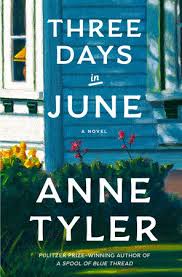
BORING!
Here, in San Jose del Cabo, there is no swimming ... the beach is black-flagged as unsafe. But you certainly can do a beach walk, as we have done every day. The surf breaks about 30 feet out, and it is shallow only that far ... maybe 30 or 40 feet.
"Shallow' is the operative word in the last sentence. This book is shallow. The plot, if it exists, is shallow, and the characters are interminably shallow. Three Days in June is 61-year-old Gail's story ... the day before her daughter Debbie's wedding, the wedding day, and the day after.
IMHO, a terrible and boring book. I do not recommend you waste your time.
April 2025
Ritu Mukerji
Mystery Fiction 2022 | 287 pages
![]()
It is 1875 in Philadelphia and the recently established Women's Medical College is the employer of our main character, Dr. Lydia Weston, where she is a Professor of Medicine as well as an attending physician. Of course, women physicians are rare at this time, suspect, held as incredulous, disrespected. When a patient of Dr. Weston's, Anna, goes missing and then is believed to be found dead, Lydia becomes an invaluable source of information to the detectives working the case.
On page 150, a twist occurs that I did not see coming!
I love Dr. Weston, and her bright, smart, snappy, assertive personality. I keep wanting to see what realization or insight she would find next.
This is the Deschutes Public Library community read for 2025 and, therefore, has nothing offensive in it and is a bit saccharin. But/and I found it an enjoyable mystery, imbued with feminist sensibilities.
I recommend it for a fun, pleasurable, easy read.
April 2025
Tim O'Brien
Historical Fiction 1990 | 233 pages
![]()
Wow. I can't believe it took me this many years to get around to reading this book. The Things They Carried is a powerful book written by a Vietnam Vet, Tim O'Brien. He mixes true stories with fictionalized stories and speaks directly to his readers a few times.
The things they carried included, of course, new testaments and pictures of girlfriends back home, but also grandpa's hatchet, comic books, statuettes of the Smiling Buddha, ghosts, expectations of their parents, fear, anger, joy, excitement, a starlight scope, moccasins, a pebble.
They also carried weapons, ammunition, grenades, C-Rations, knives, and flashlights. Depending upon their jobs, they might carry morphine and bandages, or a satellite radio, or code books.
We learn about many of the platoon members ... who they are, and, in some cases, how they died. We learn about what veterans carry after they leave Vietnam forever, including guilt and sorrow. And lifelong friendships. This is a short read, but not an easy read. It took me just a day to read it. Having recently read The Women, it gives me yet another perspective on the atrocious war in Vietnam.
The chapter "On the Rainy River" must be one of the best pieces of writing I have ever read.
This book will move you and not easily be forgotten. Yes, it should be read by all of us.
April 2025
Elizabeth Peters
Fiction 1975/ 338 pages
![]()
It has been decades since I had my love affair with Elizabeth Peters, and read most everything she wrote about the strong, ebullient, outspoken, unconventional, before-her-time, feminist, brilliant Amelia Peabody. Last week, I was at Larkspur, perusing the library a few days before we left for Cabo San Jose, in search of a paperback to toss into my carry-on, and found this, the first in her Amelia Peabody series. Elizabeth Peters is the pen name for Egyptologist Barbara Mertz. The series takes place in Egypt, amidst ancient ruins, pyramids, and tombs.
Rereading Crocodile on the Sandbar was enjoyable and easy, though the story didn’t seem to engage me as much as my first time around. There is a lot of context-setting in this novel, as we meet and discover our major characters, traveling with some of them down the Nile to an archaeologic dig. The action picks up in the last quarter of the book, as a mummy attempts to injure, kill, and/or scare aware the mostly British archeologists.
A fun read, if you are looking for something adventurous, with some romance, and a bit of historical fiction.
April 2025
Alice Hoffman
Fiction 2005/ 331 pages
![]()
The Ice Queen seems like an intriguing story, but then, near the end of it, the depth of the story and the characters and their relationships really come to fruition. I cried in the closing pages.
The ice queen herself is the narrator, and we never know her name in this first-person novel. She is struck by lightning at her home in New Jersey and turns cold. I don’t mean emotionally (though that is a battle she faces, too), but the “effects” of the lightning strike on her include the loss of mobility on her left side, an inability to see the color red, and a body that is ice cold, that needs to take ice baths.
Afterwards, her brother Ned convinces her to move to Florida which, as it turns out, is the lightning-strike capital of the country, and she enters a study of lightning-strike survivors. There she meets her friend Remy and her lover Lazarus (his real name is Seth, but after being dead for nearly an hour after his unique lightning strike, he earns a new nickname). Lazarus has a variety of different “effects,” but he is in many ways the opposite of our woman. He is literally burning hot. Sex happens in a bathtub of ice, and ice is necessary to cool off her intimate parts afterwards.
There is also some magic in the book, as the main character believes she has the power to wish something into existence. This is solidly formed in her when, as a child of 8, she, in anger, wishes that her mother will never come back when mom goes out to celebrate her birthday, and her wish comes true.
The description of lightning strike “effects” is fascinating. There are many different types of strikes, it turns out, which have many different effects on the victim’s body and psyche. We follow the narrator’s story into her partial recovery, as well as what happens to Remy and Lazarus. I was surprised at how much, near the end, we follow the narrator’s relationship with her brother Ned and sister-in-law Nina, as the narrator finally learns what love really is.
This is an odd book, and I am having trouble both rating it and deciding whether or not to recommend it. It is an engaging read … I read it quickly. I have landed on recommending it, knowing it is an unusual read.
April 2025
Isabel Cañas
Historical Novel 2023 | 384 pages
![]()
As the novel opens, Nena and Nestor are 13 the best of friends. Nena is the daughter of the owner of a Rancho; Nestor a Vaquero ... a class difference that is insurmountable in 1837 Mexico, where family and caste and economic/social status are firmly established. One summer night, Nena and Nestor meet to search for buried silver, and a beast attacks Nena. The beast emits a venom into her neck, which makes her appear, by all counts, dead. After Nestor carries her back to her home, her Mama, Papa, and Abuela declare her dead. Nestor bolts out the door in grief, shame, and fear, knowing that Nena's family blames him for her death.
And then, it is nine years later, 1846, and the Mexican-American War is ramping up. All the Vaqueros as well as the higher-class men are called upon to fight the Yanquis and defend their Mexican lands. Nestor returns to the Rancho where Nena lives and discovers she never died.
The story is a love story, and, of course a battle between the classes. It is also a story of the Mexican-American war which occurred for just under two years in 1846 -1848. I knew little about the Mexican-American war, and now I don't know much more, but it was fascinating to learn about the war, especially through the eyes of Mexicans. Mexico ceded what is now California, Nevada, Utah, New Mexico, Arizona, Texas, and parts of other states. A devastating loss for our country to the south.
But what about the vampires, you ask! We meet our first vampire that we actually know is a vampire about halfway through the book. But they are not presented as they are in the Twilight series. They are not handsome young men who want to bite your neck. They are ugly beasts who roam the lands in search of their unique food. They are harnessed by the Yanquis to attack Mexicans. They are supernatural, unearthly creatures who are key characters in the stories told of Mexican lore.
I enjoyed this rather unusual gothic historical romance novel. Thank you to my friend Kathleen who thought I would like it. I did. The one major fault? Perhaps more than any other book I have read, this book needs a map. I googled in search of a map of the two countries at the time of the war, but they only gave me a sense of the large lands that were in the dispute. I need a map that shows me, in Spanish, the towns, villages, rivers, borders, battlegrounds, and ranches.
Yes, I recommend Vampires of El Norte.
March 2025
Sophie Stava
Novel 2025 | 326 pages
![]()

Sloane, a nail tech, meets four-year-old Harper and her dad Jay at the local park, when Harper steps on a bee. Immediately, two lies pop out of her mouth ... that her name is Caitlin and that she is a nurse. Conveniently, the nail techs in her spa wear scrubs. Sloane is a pathological liar. Disappointed to learn that handsome Jay is married and not a single dad, Sloane meets his wife Violet and begins to interact with the family. Soon, she becomes Harper's nanny (it is true that she was a nanny in the past.). It is difficult to watch her obsession with Violet grow. She buys the same hat that Violet wears, colors her hair the same color, and attempts to cut her hair in the same manner (a disaster which Violet's hairdresser must rectify). She has low self-esteem and creates her life by mimicking the occasional "friend" she seems to acquire.
Sloane/Caitlin is clearly not emotionally healthy. She is pathological, shallow, vapid, empty. I wonder why am reading about this uninspiring character. And yet, I keep turning the pages eagerly. There is something about the writing and about the inconceivable story line that keeps me quite engaged.
And then, at the halfway mark, a new section in the book is introduced, entitled "Violet." And, wow! Who is the better pathological liar, Sloane/Caitlin or Violet? Everything gets turned, quite literally, upside down and backward. Violet's plan is complex, amazing, brilliant. But it doesn't turn out the way she expects. Somehow, it turns out even better!
If you are a bit unsure while reading the first half of this book, as I was, stick with it. Yet another astounding debut novel! Can Sophie Stava keep this up? Will she write another suspense novel? I will keep my eyes open and be the first to order it from the library!
Yes, have fun with this recommended read!
March 2025
Sophie Stava
Novel 2025 | 326 pages
![]()

A GUEST BLOG POST BY BRIAN GOMEZ!
A great read! Sloane is a woman with low self-esteem. Her lies get her into trouble, and not for the first time she finds she must start over. Then she finds a true friend in Violet, a wealthy woman in need of a nanny for her preschool child, Harper. But Violet is not all that she seems and the story marches excruciatingly toward tragedy, but for whom?
March 2025
Tommy Orange
Fiction 2025 | 336 pages
![]()
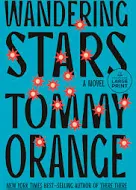
Wandering Stars is Tommy Orange's follow-up novel to There, There, which I loved. What a vast disappointment Wandering Stars is. This novel follows two sequential timelines: what happens after the Sand Creek Massacre of 1864 and the aftermath of a shooting at a powwow in 2018.
There is no plot. The only theme I find is drug addiction, and repeated failure with sobriety, rejuvenation, and recovery. This goes on for seven generations of this Native family (except we miss some generations, given the 100+ year gap in the story line). The drugs they use include laudanum, morphine, opiates, dust, opium, alcohol, morphine, hydromorphone, ketamine, MDMA (ecstasy), fentanyl, and a drug created by one character’s father, Blanx. I found the writing to be very jumpy. He intersperses present tense and past tense and has numerous confusing sentences. He uses first person, third person, and even has a very odd section of second person writing.
At page 201, I decided to skim, so I could give it two hearts instead of one. In part this was because the girls and young women of the first story line were quite interesting, but the boys and young men of the present-day timeline were boring. And in part it was because I was just very tired of reading about addiction, though I did learn a bit about Native culture, norms, values, challenges, communication, loyalty, and familial relationships.
I have no right to this opinion, but my blog is not public and only read by my friends and acquaintances, so I will venture to express my viewpoint. It seems to me Tommy Orange has sadly done a big disservice to Native populations, portraying them as drug-addicted, generation after generation, in Wandering Stars.
I do not recommend this book.
March 2025
Anthony Marra | Fiction
2022, 416 pages
![]()
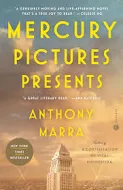
The story is about a young woman who emigrates from Italy to the US and, in 1941, is hired at Mercury Pictures. It sounded interesting! But I did not survive.
The average reading level of best-selling books, across genres, is 7th-grade. While many novels (especially) are dumbed down to this level for a more general audience, and that irritates me, I guess I am also displeased when an author uses ridiculously flowery language to express a scene or event. Here are three examples, looking only at pages 40, 41, and 42.
"Every family is a palimpsest and most days, in the kitchen, Mimi felt herself the half-effaced hardly legible text overwritten by the energetic bluster of her successors." (Pg 40). Even rereading this sentence multiple times, I still don't know what it says.
"It looked like the royal treasury of Atlantis had been dredged from the deep, given a fresh varnish, and relocated to downtown's gray-beige busyness." (Pg 41). The royal treasury?
"Once she wandered into a speakeasy gents room and beheld in the wall-scrawled vulgarities the sense of expressive possibility Monet must have felt when he saw his first waterlily." (Pg 42). Would one really actually sense this amidst the vulgarities?
One reviewer said it gets better at page 80. Another reviewer argued for page 200. Defying the "Pearl Rule of 50," I made it to page 100. I am just not enjoying myself.
Did you read and like Mercury Pictures Presents?
March 2025
Nikki May
Novel 2024 | 340 pages
![]()
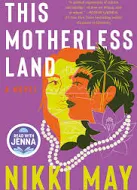
Lizzie and Margot are sisters, raised in England. Lizzie meets a Black man from Nigeria, marries him, moves to Nigeria, and her family disowns her. Later, both become mothers. Margot is cold, distant, mean, and greedy. Lizzie is warm and loving.
But this book is not about Margot and Lizzie. It is about their daughters Liv (Olivia) and Funke (Katherine/Kate). Lizzie, along with her son Femi and her daughter Funke are in a horrific car accident near their home in Nigeria. Only Funke survives. In his immeasurable grief, as well as his anger with Funke for living when his wife and son are dead, Funke's father sends her to England to live with her Aunt Margot. Liv and Funke meet for the first time, at about ten years old.
Liv takes Funke under her wing. It is a challenging adjustment for Funke, where her skin doesn't match the rest of the family nor her school or neighborhood. The girls transcend vast differences in culture, food, values, even morals, to become fast friends. We delight in their discoveries, shenanigans, coming of age together.
Until one night, a few years later, they go out to a bar together and everything turns topsy-turvy and inside out. Again Funke (now called Kate) is shipped back to her other country (Nigeria) through no volition of her own. And we follow them both into adulthood.
I liked this book. I liked Liv and Funke. It wasn't a page-turner for me, but I recommend This Motherless Land as a readable tale about the challenges of growing up in a cultural divide, and about the unbreakable love between two cousins, despite what the world throws at them.
March 2025
Amanda Peters
Fiction 2023 | 302 pages
![]()
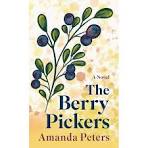
I found The Berry Pickers to be sad and rather boring. There are two primary characters ... and their chapters are interspersed. One fact that makes these characters interesting is that they are First Nation people, members of the Mi’kmaq tribe, though one of them does not know this. Their homes are originally in Nova Scotia and when young, travel to Maine each summer to pick berries and earn a living.
Joe is dying and has held on for all his life to two tragedies that happened when he was a child, the kidnapping of his little sister Ruthie, and the beating death of his brother Charlie. Joe is a sad, unredeemed man, who becomes violent and distant.
Norma is plagued by bad dreams and always has a sense that something is amiss in her family, where she is an only child of an overprotective mother and distant father, both actually decent parents.
By the third chapter in, you know the denouement. This may sound like a spoiler, but it is quite obvious that Norma is actually the abducted little sister of Joe, Ruthie.
I found the characters rather shallow and cliche-ish, and I didn't much like either one.
But the sweet tenderness of the ending almost made it all worthwhile.
Suggested by KK.
February 2025
John Boyne
Novel 2017 | 580 pages
![]()
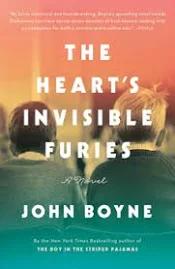
I am struggling a bit to write this review. I guess it is because this book is more of an epic than a novel. It is large and deep and bold. Thank you, Pam, for recommending this book.
Cyril's mom is 16 and pregnant when she is thrown out of her parish and her small Irish town by her Catholic priest in 1945. She gets on a bus to Dublin and begins her adult life too soon and with no support. She gives birth, then turns her baby boy over to a nun, who takes him to a couple that (allegedly) want a child, Charles and Maude Avery, when he is but a day or two old. His adoptive parents, a cold and distant mother, and a cruel and dishonest father, drill into his head that he is NOT an Avery, and should never think of himself as one, and that he is NOT their biological child, and that he should never refer to them as anything but his "adoptive" parents.
Thus begins the life of Cyril, our main character in The Heart's Invisible Furies.
Cyril's story is told in eleven parts, each seven years apart. This structure provides interesting gaps ... there is enough time for things to happen in-between each part, but not so much that you lose the thread.
Cyril comes to learn that he is a gay man, trying to find his place in the world, in a time when Catholic Ireland believed gay people were reprehensible, immoral, filthy, inferior species of humans. It was a very challenging time to learn anything about the normalcy of being gay, much less to be loved or admired or respected. But Cyril eventually understands his own humanity and fights away his shame. But that takes many years. Meanwhile, he falls in love with his best friend Julian, who is a vigorous womanizer.
Eventually, he comes into his own and finds a real relationship with Bastian, always battling the social morays of his time. He finds a job, makes friends, is happy, though life keeps pitching curve balls to him. As a reader of his life, we are privileged to follow him from the hiding and pain of his youth, to a loving, generous man who is comfortable in his own skin. His character, as written by Boyne, is astounding. We come to know Cyril extremely well. We live in his mind and heart. We cheer him on and wish him peace, clarity, and authenticity.
In the end, one important piece of his life comes to closure. I won't tell you how; that would be a major spoiler.
During the years he is 14 and 21 and 28, there is a lot of sex! I am no prude, and even enjoy reading about sex ... I just want you to know, there is a lot of it! But as he matures, of course, his hormones and Julian's calm down, and we see the more well-rounded men they have become.
I really enjoyed this book. I think it will stay with me a while. I certainly recommend it. If you have read another John Boyle, please let me know in the comments section. I think I would like to read another by this fabulous author, but don't know which one to choose.
February 2025
Percival Everett
Novel 2024 | 303 pages
![]()

An astounding book from the prolific Percival Everett, you will find this tale about "Nigger Jim" captivating. It is the story of Huck Finn and the slave Jim (who renames himself "James") from Jim's perspective. Where he went when he and Huck were separated; what feelings he had; how he thought; how he learned to run; how he concealed his proclivity with English as well as his ability to write and to read.
From The Guardian:
And whereas the Jim of Huckleberry Finn is ignorant and superstitious in ways that are played for comedy, James is a thoughtful bibliophile who debates in his dreams with Voltaire and John Locke and harbours an ambition to write his own story one day.
As in the original novel, James and Huck take flight together on to the Mississippi: Huck running from his abusive father, James because he’s going to be sold. Many of the same key incidents occur. In Huckleberry Finn, there are various sections when Jim and Huck become separated. Now we learn where James has been in these interludes.
I fell in love with Jim. His character is fully developed, and he has a pure heart and soul. I gained a new and deeper understanding for the hardships of trying to run away from slavery, at the start of the Civil War. James is incredibly well-written, and I completed it in under 48 hours. The interactions Jim has with others, and with nature, will hold your interest. But most compelling are Jim's inner workings.
I fully and heartily recommend that you read James. I know it is very popular this year and is difficult to get, and you may have a long wait at your library, but it is well worth the wait. In the meantime, I would suggest you do something I did not do ... reread Huckleberry Finn before your copy of James arrives. That will ground you further in the narrative.
February 2025
Elizabeth Strout
Fiction 2024 / 326 pages
![]()
I saw this cool graphic on the Oprah website, identifying the number of characters in Elizabeth Strout books. The highest number of characters is in Tell Me Everything. Twenty-three characters. Be prepared! The descriptions about the book tell us it is about "unrecorded lives." This is an apt description. It is a panoply of stories from people living in Crosby Maine. And the stories are interesting, even though these are everyday people. But/and I have an image of a peg board. The stories are hung on the peg board like a bunch of tools, or more accurately, pieces of fabric. Sometimes they overlap, sometimes they stand on their own.
Except of course for our main story ... the life of Bob Burgess. Bob is the 65-year-old defense attorney who is trying to find out how Delores Beach, also known by the unattractive name of "Bitch Ball" came to be found dead. Bob, who is married to Margaret, also has a burgeoning relationship with Lucy, who is living with her ex-husband William. Bob and Lucy meet once a week for a talk and a walk, and I frankly grew real tired of how Strout, at the end of each of these meetings, talks about how Bob feels seen and listened to by Lucy. The author kind of drives this point into the ground. Clearly Bob is falling in love with Lucy.
And, of all the "unrecorded lives" in this book, Bob's life is the centerpiece. It is his mind and heart we come to know, not only as he defends Matt, Delores Beach's son, but his he brings Matt back to life, how he copes with his brother’s wife Helen dying, how he helps his brother heal his relationships with his children, his strong intuition, his ability to care for and about other people’s children (though he has none of his own), his support and forgiveness for his alcoholic ex-wife Pam … and on and on. His character is somewhat implausible. Everyone loves him, he is a helper with a big heart.
So, do I recommend this book? It is fun, pleasant, rewarding. A little too saccharin for me, but it might keep you warm on a winter’s weekend.
February 2025
Betsy Lerner
Novel 2024 | 266 pages
![]()
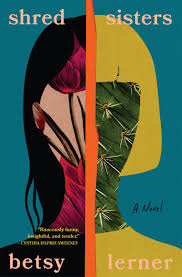
I love the quote that is associated with this book in most reviews and descriptions: "No one will love you more or hurt you more than a sister." I do not have a sister, but this quote tugs at my heart every time I read it.
I quite enjoyed this book about two sisters, based primarily in New York. Amy is four years younger than Olivia, and Olivia (Ollie) is mentally ill. The time frame is the mid-70s to the mid-90's. Especially when Ollie is younger, we see how our knowledge of mental illness and how to address it was really just at its infancy. Once Ollie hits puberty, she becomes quite unmanageable ... often doesn't come home for days on end, steals, become promiscuous, ignores the drug regimen her doctors put her on.
Amy, meantime, is stable, smart, and trying to live a normal life with a "crazy" sister whom she loves. Their parents ... especially their father ... always forgives Ollie her excesses, but miraculously, Amy doesn't seem to be injured by the imbalance. It is like a child in a family with most any disability ... that child receives more than his or her share of attention.
I really liked both of these characters, Amy and Ollie. I like where Amy developed and shepherded her career, and the ways in which Ollie avoided anything that smacks of a "profession." They both were involved with a number of men, which became just a tad confusing at times, but it is difficult for Amy to develop real friendships ... in this way, she HAS been hurt by the instability of her sister and the challenges associated with emotional intimacy.
This is an easy read, though it just might make you think. I recommend it for a winter weekend. This is Lerner's first novel.
January 2025
Katherine May
Memoir 2020 | 241 pages
![]()
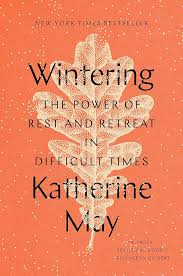
We all encounter times of wintering. Our cold, transformative, challenges may be precipitated by a death, or one's illness or the illness of another, or a child who hates the school he is at, or financial worries, or a sense of a spiritual void, or depression, or simply the short cold days of a season we mostly want to end.
May tells us about her journey through her own wintering and shares with us what she has learned, what perspectives she notices and alters, what attitudes and attributes appear during the seemingly dark time of wintering.
She tells us about the bees and how they, and the ants, prepare for winter. She relates stories of going to the Arctic, even though she is very pregnant. She travels to Stonehenge one winter solstice to learn how the people who show up there view the shifting currents of winter. She learns to plunge into icy cold waters to clear her head and regain a sense of presence, aliveness, resilience, and self-sufficiency.
I picked this up because of what I read about her integration of other authors, poets, mystics, philosophers. I enjoyed this part ... she could have done much more of it! Wintering is really a spiritual book, to savor and read slowly; to let her wisdom sink in.
Some reviewers did not like this book. They were offended by her privilege and her financial ability to travel to a spa or to see the northern lights in Iceland (she lives in Britain). While these readers vehemently claimed they were not looking for a self-help book, I believe they were. They wanted "how to winter" advice that they could apply and integrate into their own lives. Even though I am currently immersed in my own set of "wintering" experiences, I was just as vehemently not looking for any self-help. I wanted to read this book just as one woman's account of her wintering. And, as such, it was astoundingly beautiful. Her writing is simply beautiful and soothing. And still, I know that I couldn't help but learn from her story.
I recommend Wintering.
Chris Whitaker
Fiction 2016 / 361 pages
![]()
Harry Monroe, three years old, is abducted from his bed by someone wearing a clown mask. This transgression rattles the small town of Tall Oaks, which is unaccustomed to major crime.
Tall Oaks, the book, takes us into the lives of many of the residents of Tall Oaks, such as Manny, 17, who wants to be a gangster; Jess, Harry's mom, who obsessively puts up posters in town with Harry's picture on them; Jim, the local sheriff who has fallen in love with Jess; Jerry, the 500-pound manager of CopyMax, whose manipulative mother is dying of dementia and who is actually a brilliant photographer; and Jared, who moves from town to town every few months and clearly has something to hide.
The book is allegedly about the discovery of Harry's abductor, but it isn't a crime/detective novel as such. It is a psychological thriller, much more about the myriad of characters and their intra- and interrelationships. Harry's kidnapping is just the context.
Whitaker, in this debut novel, excels at building idiosyncratic, intriguing, and sometimes funny characters. The struggle I had with Tall Oaks is the format. He writes from the perspective of his characters, but typically no more than one or two pages at a time. It is difficult to keep track of who is who (and there are a multitude of other, lesser, characters in addition to the ones I mention above). It took me about half the book before I could comfortably move between characters and know whose voice I was reading. You will find lists of Tall Oaks characters on the Internet because others have had the same challenge. Use one of these lists to help you! He also does that thing that debut novelists sometimes do ... almost all of his character names begin with the same letter, this time it is a "J," making it more difficult to differentiate.
So, I enjoyed this book, but it won't be my favorite book of the year, for certain. It is an entertaining read, but not something that needs to go immediately to the top of your book pile.
January 2025
TJ Klune
Fiction 2023 | 420pages
![]()
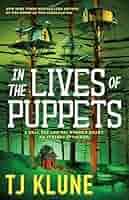
You know immediately, when you start reading this book, that it is not really about robots, even though three of our four main characters are robots. It is about people ... our idiosyncrasies, quirks, feelings, emotions, insecurities, communication styles, strengths, skills ... all the characteristics someone might program into a particular robot.
We have Victor, our one human. GIO is the robot who raised Vic from infancy. Rambo is the small vacuum robot, and the Nurse robot (Nurse Registered Automaton to Care, Heal, Educate, And Drill ... Nurse Ratched for short). Rambo loves everything about life, and the Nurse is not only brilliant, but I love it when she turns on and off her empathy protocol ... "Engaging Empathy Protocol" she says!
The four of them live on their own, way out in the forest, having no contact with the outside world. The relationships among them are loving, with lots of kidding and caring. They each bring unique proclivities to the family they have formed. Individually and as a family, Klune has created engaging and interesting distinctive characters with strong personalities. They have lovely conversations and fun teases with sexual overtones. They often make me laugh.
One day, Vic and Nurse Ratched and Rambo travel to one of the many Scrap Piles placed in the wilderness to see what they can salvage. They find the remnants of a robot named HARP, who has been decommissioned and has no memory, nor a working battery pack. They bring him home and attempt to get him operational again. After weeks of work, they succeed, and HARP renames himself as HAP. And now, there are five.
Everything is delightful up to this point. Then a crisis occurs and GIO is kidnapped by other robots, and the rest go to look for him to bring him home. Their journey begins as they travel towards the City of Electric Dreams, where they believe GIO is being held. And the story starts a slow decline, in my opinion. The journey is okay, but once they reach the City, there are way too many robots, too much chaos, too many robots with odd, sad, and destructive designations. We lose the tight connection of the family in this electric maze (as I suspect our main characters also feel), and I become bored to tears. My four-heart rating drops to three and then finally to two, as I force myself through the time in the City. There are 200 pages in the middle of this book I would pull out and rewrite to maybe 30 pages. Not surprisingly, the story reengages near the end, as the five characters become a family again (it's not as easy as it sounds!!) out in the wilderness.
I am disappointed in this TJ Klune, whom I enjoy, and am just hard-pressed to recommend it, unless you are way more interested in the machinations of robots than the workings of humans.
(My apologies to the friend who recommended this book to me. Keep on recommending please!!)
January 2025
Michael Crichton & James Patterson
Fiction 2024 | 424 pages
![]()
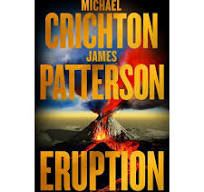
Mauna Loa on the Big Island was about to erupt. John MacGregor, the geologist in charge of the Hawaii Volcano Observatory has a big job ahead of him; to keep the residents of Hilo and other Hawaiian towns safe. With the current technology (it is April 2025 in our book) Mac knows the eruption will happen in 114 hours. But he is unwilling to start a panic and, in his press conference, tells people it will erupt "within two weeks."
But soon General Rivers arrives on behalf of the military, and we learn that the eruption of Mauna Loa is not the only problem, nor the biggest one. The horrendous problem is the extremely toxic waste buried deep in the mountain that will destroy the earth, not just the Big Island, if it is released. And the glass containers holding the toxic chemicals are so old, they are cracking and covered with fissures.
Eruption is a great thriller! No one is murdered or gets shot. It is a thriller based on a potentially huge natural (and unnatural) disaster. It is gripping, a cliff hanger, an edge-of-your-seat read.
There are many reviewers who did not like this book. Mostly, they seem disappointed with Sherri, Michael Crichton's wife, who selected James Patterson to finish this thriller that Crichton started before he died. They feel Patterson does not have the skills to live up to Crichton's scientific knowledge and, therefore, dumbed down what this book might have been.
I decided to stay out of that fray completely, since I know neither Crichton's nor Patterson's writing that well, though I have read both of them. I decided just to take this book at face value, for what was ultimately published. And I believe what is published is an engaging, thought-provoking masterpiece of a thriller. I recommend it.
January 2025
Alison Espach
Fiction 2024 | 363 pages
![]()
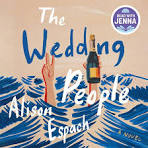
Phoebe arrives at a hotel, a mansion in Newport, Rhode, Island, in a long light green dress and without any luggage, leaving behind her home in St. Louis, a messy kitchen, and her cat Harry, who just died. She has booked a room in this gorgeous place. But it turns out she is the only person in the entire hotel who is not a part of the week-long wedding of Lila and Gary. Soon, she and the bride-to-be find themselves in the elevator together and this conversation takes place (abbreviated here):
Lila: "So, are you in Gary's family?"
Phoebe: "No."
Lila: "Are you in my family?"
Phoebe: "You do not know who's in your own family?"
....
Lila: "But if you're not here for the wedding, then what are you here for?"
Phoebe: "I am here to kill myself."
Thus begins an important and authentic friendship between Lila and Phoebe and thus begins an excellent writer with a fast-paced novel and some of the best dialogue I have ever read.
The Wedding People is simply delightful! Interesting, playful, funny characters are trying to get their lives together. We experience crazy relatives, an anxiety-prone bride, and convoluted feelings in relationships, new and old, that are sometimes deep, occasionally magical, intermittently real, and often quite unclear.
I suggest you read this with a cup of tea by your side and when the snow and cold make it unpleasant to be outside. Enjoy! And please post your reactions here.
December 2024
Gillian Linden
Fiction 2024 | 160 pages
![]()
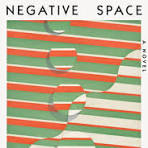
For once, I am aligned with Goodreads. Negative Space earned an unimpressive 3.29 average rating. It may be the lowest I have ever seen.
While I like the author's style with language and her pace in this debut novel, it is BORING! It is one week in the life of a part-time schoolteacher in New York, just as the pandemic restrictions were winding down. The two major themes in the book revolve around the main character possibly seeing an inappropriate interaction between a teacher and a student (she believes they touched heads), and her young daughter Jane's coping with infected gums that require the extraction of some of her baby teeth.
Negative Space is a negative read. It is not worth your time. There is nothing there.
December 2024
Ken Smith
Nonfiction 2023 | 266 pages
![]()

Something was odd about the writing in this book, but it took me until I finished it and did some research to understand. As you near the end of the book, Ken Smith has included verbatim many of his journal entries, and he, quite literally, cannot write. Incomplete sentences, sentences without verbs or prepositions, incorrect punctuation. I was not able to determine if English is his second language, or if he was uneducated or ... ? And so, he hired a ghostwriter, Will Millard. In the translation from Ken's diaries to Millard's writing, much was lost. Millard does not have the passion or heart that Smith has. I wish he'd hired Millard to write the book as a biography about Smith, and incorporated more of Ken Smith's fascinating, if frustrating, actually diary entries.
Now that I have presented my pretentious opinion on writing, as though I actually know what I'm talking about, let's get to the meat of Smith's life story.
This is actually a very interesting book! Ken Smith becomes a hermit, and lives in Canada and in the Scottish woods by himself for some 40 years. No surprise, what he learns about flora, fauna, wood, lochs, weather, eating, and survival is astounding! My favorite part is when he builds a cabin for himself, based upon the principles employed by Dick Proenneke in building his cabin at Twin Lakes in Lake Clark National Park. I had the privilege of visiting Proenneke's cabin, so this chapter was so real and tangible to me.
You will learn a great deal about the immense challenges of living off the grid. It takes considerable physical and emotional strength to keep one's cabin warm, to feed and clothe one's self, to be with the much desired peace and solitude, to have no access to services of any kind without a 7-mile walk in one direction, or longer. And Smith is aware, present, and introspective in his simple life.
The Way of the Hermit is being made into a movie, which I do not to see. I suspect it will move even further from the truth of Smith's utterly fascinating life.
Yes, read this book, for its content and passion, and do not worry about the writing. Maybe you will love even that! (And, by the way, if you read the soft-cover, there are two sets of photographs. The first set includes some spoilers, so I suggest you skip past these photos until you reach the end of the book.)
December 2024
Joanna Quinn
Novel 2022 | 576 pages
![]()
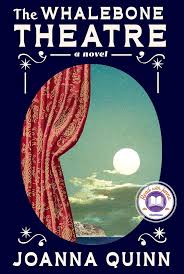
As I prepare to write this blog post, I keep having an image of a stately mature tree ... deciduous, maple I think. Whalebone Theater Is like that tree to me. The major British characters, who relate as though they are two sisters and a brother, Cristabel, Flossie, and Dingby, play together, come of age together, find a beached whale together, reach to each other for emotional support in a family that abstains from it. I adored the three of them together and their unyielding love, acceptance, and respect for one another. They are solid as they weave together, like the trunk of my maple tree. And that is the first half of the book.
Then the branches separate and differentiate and grow in their own ways, though all three are supporting Britain in the war effort of WWII. It is here where the book loses its charm a bit for me .... when the trio separates and they become their own unique people in the world.
Though my concern about where Ms. Quinn took the plot is not enough of a problem to reduce my four-heart rating. The writing in this debut novel is astounding ... beautiful, visual, clear, deep. Her characters are real, profound, and eminently lovable. As she carries them forward into the challenges of the War, we also learn something about agents, secrecy, and the Resistance.
This is an astounding debut novel. How can one person have so much story within herself to tell? It is broad and deep, spanning decades.
Thank you Josie for this recommendation. I do look forward to discussing in book club in January.
December 2024
Ann Patchett
Fiction 2023 | 464 pages
![]()
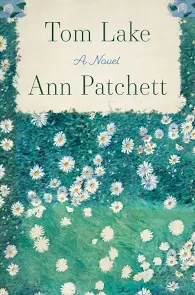
One friend liked this book ... found it sweet and interesting. Another couldn't finish it because she was bored. I was in the middle between these two opinions but have leaned into boredom.
This book has no plot. I did quite a bit of research into reviews to see if anyone identified a plot that I was missing. Nope. They all say this book is about love ... romantic love, maternal love, and familial love. But no one tells us the plot. The "plot," for what it is worth, is a mother telling the story of her youth to her three grown daughters when they are all in seclusion at the family farm near Traverse City, Michigan, picking cherries, during the Covid Pandemic. Yep, boring. Even if she did date someone one summer who would later become a famous actor.
I better get a four-heart book into my blog soon, so you all will have something juicy to read as the snow begins to fall. I am optimistic about my next two books, including Whalebone Theater.
November 2024
Every once in a while, I like to remind my readers. Here is my best attempt to explain what the hearts mean:
![]() Like it a lot or loved it; I recommend it; put it on your list!
Like it a lot or loved it; I recommend it; put it on your list!
![]() Like it; I recommend, with some reservations.
Like it; I recommend, with some reservations.
![]() I don’t recommend it, though it was compelling enough for me to finish reading.
I don’t recommend it, though it was compelling enough for me to finish reading.
![]() I couldn’t get through it
I couldn’t get through it
Dennis Lehane
Fiction 2023 | 299 pages
![]()
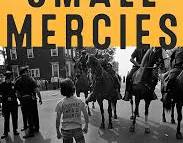
Sharp action, short quick dialogue. This mystery takes place in the context of the first school busing that occurred in Boston schools, in 1974. It is a fight about busing, which it seems neither black nor white families want. It is a vivid description of racism at that time. It is a battle on the streets in protest. And a few nights before busing was to begin, a young white woman, 17, a Southie named Jules, goes missing. Not so coincidentally, a young black man falls under a subway car and is killed that same night. We follow Jules' mom, the extremely self-sufficient and violent Mary Pat, as she attempts to discover if her daughter is dead or alive, and, if alive, where she is hiding.
That is a great story line! Unfortunately, Lehane writes with extreme violence and racist language incorporated into his conflict scenes. As I close the book for the last time, I am fighting the urge to keep my stomach under control, and I needed to go collect a soothing hug. I cannot believe we chose this book for book club. I think I will be absent for the conversation.
I would have liked a historical fiction novel about the beginnings of busing. Regrettably, this is an ultra-violent gratuitous thriller. I cannot recommend it at all.
November 2024
Matt Haig
Fiction 2024 / 324 pages
![]()
A small, long-ago act of kindness towards her colleague Christina leads to 72-year-old Grace being bequeathed a house in Iziba, Spain. Puzzled as to why a virtual stranger would do such a thing, Grace decides to go visit the house.
Grace is filled with grief, being recently widowed and also losing her son Daniel in a bicycle accident.
This book is the story Grace writes in a very long e-mail to one of her former students who is struggling in life. Grace proceeds to tell this student how she, too, has been struggling through her life, and how this house changes her life. Once on Ibiza, she is drawn towards La Presencia, where she discovers and claims her psychic fantasy powers.
This book is 100 pages of unmitigated grief, followed by 225 pages of a story. Now, I like fantasy and magical realism in a novel, but this was about 70% fantasy and 30% real story. The story is like a skeleton on which Haig hangs the fantasy. Someone on Goodreads said it read like a first draft and I can agree with that. Just too much gravy and not enough meat.
I read the entire book and enjoyed it somewhat, but I hesitate to suggest you put this book on your nightstand.
November 2024
Grayson
Lynne Cox
Biography/Memoir 2006 | 148 pages
![]()
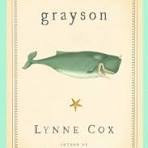
Early one California morning, 17-year-old long distance competitive swimmer Lynne Cox was swimming off the coast, nearing the end of her three-hour workout, when she felt something shift in the water. Swimming near her was a baby whale ... with no mother to be seen anywhere. This is the remarkable tale of that morning, swimming with the gray whale, whom she names Grayson, and searching together for his mother. At his young age, he will die without her. She is his only food source for the first eight months of his life.
The true story is heart-warming and touching, speaking to the connection that can happen between humans and animals. Cox's sense of the power of our minds to communicate and connect really resonates with me. I also like how much she shared about the other sea animals they encountered, from dolphins to sunfish.
I cried near the end.
You only need part of a Saturday afternoon with a cup of tea by your side to read this book. It is short and a fast read. I recommend it surely!
November 2024
Betty Webb | Fiction
2023, 352 pages
![]()
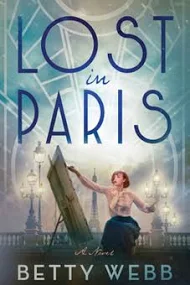
Maybe it is Betty Webb. Maybe it is me. Maybe it is the distraction of the @#^%$ election. But 110 pages in, I am disengaged and bored. Check out my next blog post if you want something juicier.
November 2024
William Kent Krueger
Fiction 2019/ 450 pages
![]()
William Kent Krueger is nothing if not a phenomenal writer. I know the major characters in this book so well ... Odie, Albert, Mose, and Emmy. I feel as though I could predict how each would act, if they showed up at my home today. I know their mannerisms, their personalities, their gifts, their values, their fears, their failings. Krueger truly shines at developing characters.
In This Tender Land, three young White kids and one Native leave an Indian school where they, as well as the many Indian children, were abused. The year is 1932 and there is no love between the White man and the Native population. Emmy is six, our narrator Odie is 12, his big brother Albert is 16, and I don't think we know exactly how old Mose is, though we do know someone cut out his tongue when he was four and he is mute. Odie and Albert end up at the Indian school when their parents die because there is no room at the white orphanage. Emmy becomes an orphan during the telling of this tale.
The four children, who are fast friends, run away from the school in a canoe, traveling the Gilead River and then the Minnesota and finally the Mississippi. This Tender Land is all about their travels and who they meet along their way to St. Louis, where Albert and Odie have an aunt, Aunt Julia.
The story is grim at times, heart-warming most often, and full of good people and bad people the four vagabonds encounter in their travels down the rivers. While it is a novel, clearly the foundation is rich in research and learning about what our Midwest was like during the Great Depression and a time when we had not come to peace with the Natives who occupied this land for centuries. You will meet many interesting and entertaining characters in this novel in addition to our four main characters.
I give it three hearts instead of four, because I felt it dragged and was slow at times. Many of you, as well as many reviewers, will disagree with this assessment. As always, take my assessment with a grain of salt and enjoy This Tender Land for what it gives you.
November 2024
Kristin Hannah
Historical Fiction 2024 | 480 pages
![]()

The longest wait at the library finally came to an end! After months of moving up the wait list, I finally received a library copy of the immensely popular The Women.
It was worth the wait.
I thought it was a non-fiction book until I brought it home and discovered it was a novel. A novel about Frankie McGrath, who, with two weeks experience after nursing school, volunteers to be a nurse in Vietnam, coincidentally on the morning of the same day she and her parents receive notice that her beloved brother Finley was shot down and killed in Vietnam.
Frankie's story is a conglomerate of the women nurses who served in Vietnam, invisible to most people both in-country and back home, except for those soldiers who were injured and medivac-ed into the nurse's care. This is a page-turning book, but often not an easy read. It is by no means light and flowery.
The first section is about her experience in Vietnam. I would not personally call it gruesome, but the realism is heart-breaking. You will read about the men who are put in body bags and placed on sawhorses for the morgue; about the "expectants" who are not treated because they are expected to die momentarily; about shrapnel and chest wounds and bomb carnage and buddies carrying in their friend, holding his leg in one of their hands. You will read about napalm, about bombings done by the US of Vietnamese villages, and about helicopters arriving at 2 am and rousing the nurses out of their beds.
And then Frankie comes home, to parents who were so ashamed of her for going to war that they told their friends she was studying in Florence. You will read about the myriads of people, including Vietnam veterans, who deny her experience because "there were no women in Vietnam." You will read about her being spit upon. Most important, you will read a lie that she chose to not question for years ... that her job is to "forget." This was a time before PTSD was recognized by the AMA, and Frankie had no help, recognition, nor validation of nightmares that threw her off her bed, of her screaming, of anger and fear of noises, of her eventual drug addiction and suicide attempt.
Some reviewers did not like that Hannah included Frankie’s love affairs. I did! This is normal for an early-20-something woman. However, Kristin Hannah says in an interview on her website: "You’ll probably be surprised to hear that the most difficult aspects of this story for me, as the writer, centered on the love story." I am not surprised at all. She seemed uncomfortable writing about Frankie's love life. I didn't feel as though she truly saw and could relate to this part of Frankie. The one aspect that made this clear is Hannah never saw anything good in these liaisons. They all end in trauma or tragedy, and never just the way relationships typically end ... a growing apart, or development of different awareness.
Yes, for sure, I recommend The Women. If you were alive during the Vietnam war, you will find this book brings up memories for you. Perhaps, like me, it may remind you of some action you took personally that you are no longer proud of. It is worth the introspection. Thank you, Nina, for your recommendation.
October 2024
Emilia Hart
Fiction 2023 | 356 pages
![]()

Many reviewers wrote that this book is about misogyny, rape, abuse. Many wrote that it was about the resilience, strength, independence, and determination of women, I agree with the latter interpretation. To pay too much attention to the abusive men makes them more important and, in this novel, diminishes the women.
The women, who lived in 1619 (Altha), in 1942 (Violet), and in 2019 (Kate) are women who took charge of their lives. These women loved nature and had a special gift for healing that, in Altha's case at least, would label her as a witch.
I loved the interplay of the three women ... each of the 53 chapters was written from the perspective of one the women, and each moved the story forward. Combining elements of women’s fiction and magical realism, author Emilia Hart expertly weaves the three different threads of this story into a compelling narrative. It is a creative and engaging debut novel.
Weyward women belong to the wild. And they cannot be tamed…
I recommend this strong novel. I am looking forward to our discussion in book club tomorrow night. Thank you, Jan!
October 2024
Nevada Barr
Fiction 2012 | 368 pages
![]()
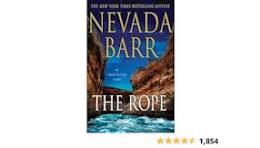
I am probably not the only one amongst us who has read a number of Anna Pigeon books by Nevada Barr. Ms. Barr's first Pigeon book of 19 was written in 1993. Anna is a sleuth who solves mysteries in National Parks. She is a strong and delightful character in beautiful and inspiring settings.
The Rope is the 17th book in the series and is essentially a prequel. Nevada Barr fans have been asking her to write a book about how Anna Pigeon gets started as a solver of mysteries, and this is her answer. Anna finds herself working as a seasonal worker in Glen Canyon National Recreational area after the death of her husband, and her desire to stop being a stage manager for off-Broadway plays. When she arrives, she is pasty, skinny, weak, and uneducated about the wilderness.
When we first meet Anna, she is at the bottom of a deep sandstone hole in the desert in Glen Canyon. She is completely naked, drugged, molested, and dying of dehydration. The first third of the book is a macabre story about her time trapped in this hole. I began to wonder if the entire book was going to be set here, in which case it may just have been too gruesome for me to complete reading. But Anna finds her way out, and, for the rest of the book, searches for the perpetrators who nearly killed her, and did in fact kill a woman named Kay whom Anna finds buried in her hole (which she calls a "jar."). We get to learn about Anna's motivations, proclivities, personality, decision-making, courage, resourcefulness, wisdom, and grief.
This is a marvelous Nevada Barr, with her crisp, tight writing and creative murders. If you have not read a Nevada Barr, this would be a fine place to start! If you have read this author, you can pick up The Rope anytime. Except it is so popular there are wait lists at the libraries! Yes, I recommend The Rope for your reading pleasure and to feed your imagination.
October 2024
Anna Quindlen | Fiction
2024, 304 pages
![]()
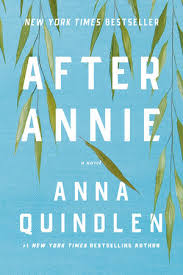
Too saccharin and shallow for me.
October 2024
.
Kevin Fedarko
Nonfiction 2024 | 488 pages
![]()

The depth, the intricacies, the anguish, soul-arresting views, moments of great fear, but constantly prodding on, most of the time on foot, though sometimes rappelled by rope.
Kevin and his friend Pete walk the entire Grand Canyon, 750 miles, in a year which includes untold thousands of feet of elevation gain and loss through canyons, crumbling ledges, slot canyon rappels, endless searches for potholes and springs to provide water, blisters, bites, temperatures in the 90’s and 100’s and occasionally way below freezing, and probably thousands of cactus needles embedded in their skin.
He also integrates the culture of the Canyon, specifically educating us about the atrocious relationship between white people and Native American tribes. Horrific treatment leading to abject poverty (in the spiritual as well as the financial sense of the word ...)
Another wilderness adventure, which many of you know is a passion of mine. But sometimes women and men who achieve great feats in the wilderness cannot write worth a darn. Bu Fedarko? His writing was so beautiful, so exquisite, so engaging, that I consciously slowed my reading to enjoy his words as well as his sentiment. It takes quite a while to slowly read a 488-page hardcover book.
At times it was challenging to understand his descriptions because words do not adequately describe the magnificence he was witnessing. And sometimes his maps were a bit hard to follow. But the story ... what a truly amazing journey! Of course, I could not experience the heavy packs Kevin and Pete carried, the animals they observed, nor the slippery rocks they navigated.
On balance, I heartily recommend this book if you are a lover of the great outdoors and/or our country's most magnificent scenery. But do not expect to read it in a weekend. It may take a bit of time; it took me nearly two weeks. And it was worth every moment.
October 2024
M.C. Beaton
Fiction 2023 | 242 pages
![]()
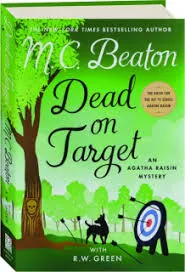
I will not be watching the Agatha Raisin TV show, nor will I go in search of any of the other 34 books in the Agatha Raisin Series. Dead on Target was enough for me. A fairly typical British mystery story, Mrs. Raisin retires, moves to Cotswold, and becomes a private detective. In this book, she solves the mystery of a murder performed with an arrow. The writing is light, easy reading, not complex.
However, I really don't care for our main character, the divorced Mrs. Raisin. She has a sharp tongue, is somewhat brutal in her words. A good heart, granted, but a mean communicator. And, perhaps even worse, she is obsessed with how she looks. What other character would take our her compact and fix her lipstick after just having found a murdered body, but before the police arrive? She also walks in town, and notices how good she looks in her reflection in the shop windows. Some readers may find this quirky character trait quite enjoyable, sweet, even funny. I did not like it one bit.
I don't recommend Agatha Raisin to you.
September 2024
Tony Hillerman
Fiction 1988/ 207 pages
![]()
It was fun to reread one of Tony Hillerman's 38 books, especially one from his 18-book Navajo Mystery Series featuring Jim Leaphorn and Jim Chee. A nice revisit and respite. Lovely descriptions of Ancestral Puebloan pottery, and the landscapes in which they are found, coupled with the search for a missing anthropologist, makes the plot interesting and quite visual.
Truthfully, though, reading this inspires me to read/reread a Nevada Barr book with the character Anna Pigeon. I have decided to try on The Rope.
Relax and enjoy!
September 2024
Barbara Davis
Fiction 2023 | 425 pages
![]()
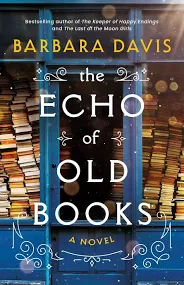
Thank you, Donna, for suggesting this fun book, The Echo of Old Books.
Ashlyn is the proprietor of a rare books store and is gifted with psychometric abilities that allow her to read the vibrations of old books and sense their previous owners' feelings. When she picks up an old book, she feels the emotions of the owner(s) of the book. This is a gift most of the time, even though she can’t really tell people about it, because they look at her oddly! Sometimes it is challenging, especially when the emotions are dark or depressive.
In The Echo of Old Books, Ashlyn finds two books in a box of donated books, that are without an author or a date or a copyright, but with very strong emotions. What has she discovered? She finds herself compelled to uncover who the authors are and the circumstances that caused them to write and bind but not publish two books, Regretting Belle and Forever, and Other Lies.
Belle and Hemi are all we know about the (female and male) authors as the book begins, but we eventually discover who they are to each other, to their extended families, and out in the world. And how badly they hurt each other.
This book has an interesting premise and is a pure delight to read!
September 2024
Javier Zamora
Memoir 2022/ 381 pages
![]()
This is the memoir of 9-year old Javier Zamora's seven-week journey migrating ("illegally") into the United States from El Salvador in the summer of 1999. He was attempting, alone, to get to his parents in San Rafael, California, who migrated five years earlier. His journey was supposed to take two weeks; it took seven. A mom, daughter, and one of the men "adopted" Javier and the four of them became a "family" who took care of one another for the duration of the crossing from El Salvador through Mexico and into the U S.
The first half of this book is very slow, which reflected the actual speed of his travel. He would spend many days and nights in "apartmentos" or hotel rooms, waiting for the next coyote or the next connection to continue his journey. Just over halfway in, the book sped up as Javier's journey sped up, near the US border, and interactions with border agents made it a scary journey for sure.
A reviewer says this, "I am pretty certain I would have preferred this to be an autobiographical novel or an adult memoir reflecting on this childhood journey. I just could not suspend my skepticism that all the extended dialogue and journey details could be captured so accurately 20+ years later." I think that is an accurate reflection of what I felt. How could he remember how many water bottles he carried on a particular day, or how the refried beans tasted 20 years ago. It degraded the credibility a bit.
I kept feeling I "should" read this book (plus it is a book club read) and I was not surprised to find that the majority of the reviews I read used the words "should read" when describing this book. It IS important to read. We don't often see true narratives of immigrants making this difficult journey. It will inform you, teach you, raise your empathy, and inspire you, as you read about kindness, bravery, family (both blood and adopted), determination, and hope.
I could not find the meaning of the title, even after researching it!
So, yes, I recommend this memoir but know it may take you some concentration. By the way, there is a lot of Spanish in Solito which some people found annoying. I found it delightful.
August 2024
Kamala Bremer & Rosalyn McKeown-Ice, editors
Nonfiction 2022 | 232 pages
![]()

In 1979, seven women, ages 26 - 40, came together through their connections and interests, to canoe 172 miles on the Fortymile and Yukon Rivers in Alaska for 11 days, from the town of Chicken to the town of Eagle. This trip, when the women's movement and environmental movements were in their infancies, served as a foundation and mirror for the rest of their lives. When my friend Carol loaned me From Chicken to Eagle, I assumed it was a book about a thrilling, exciting all-women wilderness adventure. It was that, yes, but it was so much more.
Thirty years after the canoe adventure, the women decided to each write a chapter to create the core of this book. Each included their own perceptions, perspectives, and memories from the challenging canoe trip ... but they did so much more. About three pages of each chapter presents each woman's memories. But the mainstay of their writing is about the impact of this trip ... how it built their strength and self-esteem; how it informed their relationships with the wilderness; how it showed up in marriages and child-rearing in some cases; and mostly how it prepared them to launch into major careers at a time when the cultural belief was that women couldn't and shouldn't do much in the work world.
We have in this team of women a lawyer, a doctor, a business leader, non-profit founders and leaders, a writer, a professor, a public relations person, a public health officer. More profound and impactful, we have environmental and social justice activists. These women started day care centers, recycling programs, sustainable education initiatives, climate change strategies, mentoring, political and policy change. They also remain, at ages 66 to 80, canoeists, kayakers, hikers, bikers, explorers, tour guides, adventurers.
Though it wasn't what I expected, From Chicken to Eagle is a fascinating, empowering, and inspiring read. If you are anywhere near my age, it will also bring back memories and cast a new light on what we really did accomplish in our 20s and 30s, and how far we still have to go. Yes, I recommend this short book.
August 2024
Kevin Kwan
Fiction 2024 | 467 pages
![]()
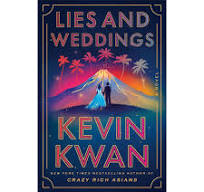
I loved this book from page one. I don't know why books about superbly rich people keep showing up on my bookshelf these days but Lies and Weddings just seems to have none of the ostentatious excess of The Magnificent Lives of Marjorie Post.
The super-rich characters in Lies and Weddings have depth, unique characteristics, well-developed roles, and Kevin Kwan has subtle, wry humor, and a marvelous way with story.
The gargantuan Gresham legacy is flat broke, though the (not very likable) matriarch Arabella does not know this and spends millions and millions in the 437 pages of this book. Nevertheless, she wants to marry off her daughters to men with titles and significant fortunes themselves, and she especially wants to marry her (gorgeous) son Rufus into money. To that end, she keeps fixing him up with entirely inappropriate partners. He is a man with a kind heart and generous soul and the facade of these heiresses do not begin to interest him. And then there is “the girl next door” … a physician, Eden, whom Rufus asked to marry him when they were fourteen.
Because the characters are Chinese, or half-Chinese, or in some way connected to international Chinese culture, each new character is introduced to us with their educational pedigree: (pg 71) for example, “Laurel (Balboa/Thacher/Cornell/MIT) …”. This is delightful! It made me smile every time, though I didn’t know more than a third of the institutions. The introduction of the filthy rich addict Luis Felipe will touch your funny bone!
The fashion, the designer names, the costs of the dresses the women wear to various weddings and pre-and post-wedding events are not even comprehensible in my mind, as I sit here in J. Jill jeans and a long-sleeve t-shirt that is no less than 30 years old!
Yes, enjoy this novel! I started it Tuesday morning at camp and finished it Wednesday afternoon.
Another summertime read recommended by The Week.
August 2024
Laura Lippman
Fiction 1997 | 369 pages
![]()
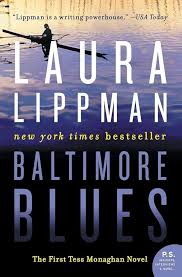
My friend and college roommate Janet suggested I try Laura Lippman after my last post, asking for mystery series. I just finished the first Tess Monaghan novel, Baltimore Blues. It is fun, fast and feisty. Tess has lost her job as an investigative reporter at a local newspaper that folded. At 29, she is trying to get her life together, knitting together small granny squares of jobs, such as working in her Aunt Kitty’s bookstore (Tess lives above the store for reduced rent), and doing administrative work for her uncle.
Less one think she is lazy (she IS accused of this on occasion), she also runs three (?) times a week, rows at 5:30 am six days a week, and lift weights three times a week.
And then her friend and rowing buddy Rock hires her to do some investigation into his fiancé Ava, who disappears at odd and frequent intervals. This begins a series of mysteries and murders that Tess finds herself compelled to investigate, under the radar screen, and mostly without much-needed compensation.
I loved reading about Tess trying to make her way in this new world of murder investigation, all on her own. I really like her as a person … free spirited, smart, and energetic. I will read the next book in the series, Charm City, and I recommend Baltimore Blues.
August 2024
David Nicholls
Fiction 2024 | 349 pages
![]()
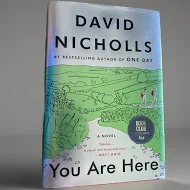
Since it took me 30 pages to figure out what this book us about, I thought I would make the opening chapters easier for you. From Wikipedia:
"You Are Here is a 2024 romance novel by British writer David Nicholls. The novel centers on two middle-aged protagonists, who unexpectedly find themselves together on a long-distance walking trail across northern England after being brought together by a mutual friend."
Marnie is stuck in life. Stuck working alone in her London flat, stuck battling the long afternoons and a life that increasingly feels like it's passing her by. Michael, on the other hand, is coming undone. Reeling from his wife's departure, increasingly reclusive, taking himself on long, solitary walks.
A mutual friend invites them both on a walk across England, sea to sea.
The story is sweet. The writing is good. Yet, I fell asleep about every third page. I finally figured it out; it was simply a boring book. It moved too slow for me, with little adventure or intrigue. I am glad to be done with You Are Here and I do not recommend it. Suggested as a summer read by The Week magazine.
August 2024
William Kent Krueger
Fiction 1998/ 330 pages
![]()
I read and really enjoyed Ordinary Grace (see my blog post; 4 hearts) and then discovered that William Kent Krueger is a prolific writer, with 26 books to his name, 20 of them in the "Cork O'Connor Mystery series." So, I thought I would try the first book in the series, Iron Lake.
Scatter shot. Those are the words that come to mind when I think about how to describe Iron Lake. Too many characters, too many deaths, too much shallowness of characters. I really don't know what happened, including at the end where the author wraps the story up.
The main character, Cork O'Connor, is the former sheriff in the town of Aurora, near Lake Superior. Of course, he can't stop "sheriffing." The descriptions of the snow, the water, the freezing temperatures are vivid and compelling. Cork is the only character we gain real insight into.
I will not continue with the next books of the series. I just didn't care for Iron Lake enough to do so.
Which makes me want to ask ... the time may be upon us ... do YOU have a good mystery or time travel series to recommend to me? Cooler weather will come soon! (Even though it was 102 today.) Think Robert Parker’s Spenser series (mystery) or Diana Gabaldon’s Outlander (time travel).
I don't really recommend Iron Lake, but some of you might want to give it a try.
August 2024
.
Susanna Janssen | Nonfiction
2018, 366 pages
![]()
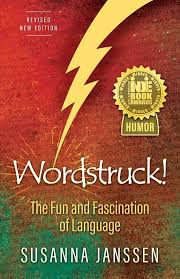
The writing is staccato ... almost like a dictionary itself. Because it is played in a constant 4/4ths time, I find it hard to recall anything. I wish she had written about way fewer words and given more context. Then something might have stuck. Here is an example. On page 63 she talks about the etymology of tycoon, alligator, arena, dandelion, inaugurate, muscle, and pupil. Not well-organized nor categorized; too much information; not enough knowledge.
Janssen also tries hard to insert humor into her commentary, and I think she is simply not funny. Her humor feels forced. It feels as though it was added in afterwards.
I read 76 pages. My apologies, Nina, for not falling in love with this book!
Let's see ... what awaits on my shelf now?
.
Tracy Johnston
Nonfiction 1992 | 356 pages
![]()

This is an amazing true adventure book. The author, Tracy Johnston, is part of a small group of people to raft the Boh in Borneo ... the first trip EVER down the Boh. It is such an adventure because there are no maps, no guides, no notes from those who have gone before. All they have are stories from native Borneo people who believe the river to be un-navigable and are fearful of the spirits who inhabit the Boh.
A few guides and a few experienced rafters have chosen to take on the Boh. What they anticipate to be a three-day trip turns into ten days. The rapids are much more difficult than anticipated, the rains can raise the level of the river as much as 20 feet in one hour, and the bugs! Oh my, the stories of the bugs! I will never look on a honeybee with quite the same eyes.
Tracy begins this adventure by losing her luggage. So, her well thought out boxes with medicines, salves, and various pills, along with her box that includes her sleeping bag, air mattress, shoes, underwear, flashlight, and all her clothes, end up in the LA airport when she arrives in Borneo. She has to beg, borrow, and steal all her supplies for this serious adventure.
The tale is a quick read. Johnston uses very short chapters which keep the pace moving. At times, the book drags a bit, because the rafting trip drags a bit. There are days when the three boats travel only yards instead of miles. The difficulty of staying kind and stable and compassionate in the midst of innumerable delays, and bodies that are constantly sweating and becoming the home base to numerous bugs, is unimaginable.
Tracy is in her 40s, which makes her story even more amazing. She us not a young super-jock.
Again, if you love real-life wilderness adventure stories as I do, you cannot go wrong with this one. It reads like no other. This won't be the fifth book you have read about Everest, or another tale of canoeists in the great north. Thank you to my friend Joanne for the loan of this not-very-well-known tale.
July 2024
Celeste Ng
Fiction 2022 | 235 pages
![]()

The three pillars of PACT:
- Outlaws promotion of un-American values and behaviors.
- Requires all citizens to report potential threats to our society.
- Protects children from environments espousing harmful views.
It is Cambridge, Massachusetts, just about a decade after PACT was passed by the House and Senate and became the law of the land. PACT was a reaction to the Crisis, an economic, social, familial, cultural, structural collapse of the American Society. No one actually knows what created this collapse, though within three years after it began, it became easier and easier to blame it on the Chinese, with no documentation or proof, just because a scapegoat was required.
Enter Bird, the 11-year old son of a Chinese-American woman, Margaret, and a Caucasian-American man, Ethan. As the book begins, we learn that Margaret left her husband and son three years ago, but we don’t know why. Ethan keeps telling their son to forget about her.
Of course, the consequences of PACT are fairly predictable to us as readers. People are arrested who participate in a demonstration, or even a conversation that is anti-PACT. Neighbors report neighbors for the slightest perceived infraction, or no infraction at all … especially if their skin has a yellow tinge. And perhaps most painful of all for society, children are continually removed from their homes and subjected to “re-placement” if a case can be made that the parents had any anti-PACT influence on them.
Bird begins to search for his mother without telling his father. This is much harder than today, because most books have been removed from the shelves and some burned, and the internet has been scoured “clean.” Bird comes to recognize that the absence of his mother, who is not only Chinese-American but verbally opposed to PACT, is actually to protect Bird and keep him united with his father.
Eventually he finds his mother, but I can tell you no more without giving away the plot.
This is a good read; an interesting read; a read that is steeped in world history and even present day. I do recommend you read it and I thank my friend Michelle for giving it to me!
July 2024
Allison Pataki
Fiction 2022/ 285 pages
![]()
I guess it is my fault. I had heard about The Magnificent Lives of Marjorie Post and read about it also. I apparently misunderstood. I thought it was about a highly successful business tycoon, leader, strategist, dynasty. It is not. It is about a woman who plays a peripheral role in the company her father built.
MID-READ REVIEW. I am exactly half-way through, page 192, and Marjorie Post has not done a bit of business so far. It has been all about her love life, her children, her entertaining, her parties, her multiple homes, her money, her staffs, and a BIT about non-profit work. I am sorely disappointed. That is not what I understood this book to be about. I thought it was about a business success story.
The story covers a surfeit of money among the Posts, Vanderbilts, Rockefellers, Roosevelts, and a score of others. I found the ostentatious excesses of the super-rich turned my stomach at times. (Do I have a bit of communism in my blood?) Yes, Marjorie Post gives away millions for health care facilities, to support our troops in the Great War, to provide food and shelter during the Great Depression. She uses her money well and for superbly excellent needs. However, the overabundance still upsets me. The last of many mansions she built for herself and her family had 125 rooms, with huge numbers of staff. And the art she collects is impressive. Not to mention all the custom gowns and clothing from Paris and other fashion hotbeds.
That all being said, the writing is delicious. Pataki writes a biography in first person; not always an easy feat to accomplish. The main theme of the books is about Marjorie and her four husbands. I thought these relationships were presented with depth, insight, sorrow, and aplomb. You may enjoy reading The Magnificent Lives of Marjorie Post. Many readers have. I cannot advise you to put it at the top of your reading list.
July 2024
William Kent Krueger
Fiction 2013 | 307 pages
![]()

Told from Frank’s perspective forty years after the fateful summer of 1961, Ordinary Grace is a brilliantly moving account of a boy standing at the door of his young manhood, trying to understand a world that seems to be falling apart around him. That summer, there are numerous deaths in the small town that Frank and his younger brother Jake live in.
Though their father is a pastor, and the boys are steeped in the ways of church and god, and god is a central theme through the book as well as how community members do and do not process their grief, I did not find it to be overly "god-centric." It is definitely about grace and forgiveness and being in nature and talking things through and examining one's beliefs and finding inner peace, gentleness, and acceptance. But you need not believe in god to gain this book's wisdom.
The title is finally stated deep in the story, when a bereaved mother snarls at her husband over the dinner table: “Can’t you, just this once, offer an ordinary grace?” But grace has already come into play many times.
There are many definitions of "grace" and most of them are religious, but this one really resonated with me, from Dictionary.com, "elegance or beauty of form, manner, motion, or action." In grace, we forgive, accept, do not judge, are open, we love. It is truly elegant.
But let's talk about the writing. That's what really puts Ordinary Grace in the "yes, please read" column for me. There are numerous deaths over this summer, and I so appreciate the coming-of-age story as told by a man 40 years beyond this summer. The characters are each unique, with their own quirks, foibles, gifts, ability to love deeply, and, yes, graces. Kent does a superb job of developing each of these characters and giving us insight into their feelings and actions. More than anything, this is an enjoyable novel/historic fiction to pleasure your summer afternoons. Please read and delight in this Oregon Author!
July 2024
Isle McElroy
Fiction 2023 | 245 pages
![]()
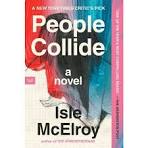
The plot sounded interesting. Eli and Elizabeth trade bodies, unintentionally, and he becomes emotionally Elizabeth in her body while Elizabeth becomes Eli in his body.
I thought it had promise. But the promise is unfulfilled. No science fiction ... no scientists trying to find the answer to this phenomenon and predicting whether it will benefit or hurt humans. No mystery. He/she doesn't even think to look for him/her for five days. No context. Neither the loss of their bodies nor finding each other again in a changed state had any story around it. It just happened. Left me scratching my head. No magic or fantasy. There seems to be no genre.
No ending to speak of. Avoid this book. I am impressed I made it through the whole thing.
July 2024
Kazuo Isighuro
Fiction 1989/ 245 pages
![]()
The Remains of the Day is a 1989 novel by the Nobel-Prize winning British author Ishiguro. (See my blog post on another Ishiguro, Klara and the Sun.) The protagonist in Remains of the Day, Stevens, is a butler with a long record of service at Darlington Hall, a fictitious stately home near Oxford, England. In 1956, he takes a road trip to visit a former colleague and reminisces about events at Darlington Hall in the 1920s and 1930s.
Told in first person, the novel tells the story of Stevens, an English butler who has dedicated his life to the loyal service of Lord Darlington, who is recently deceased. Two important contexts present themselves: Lord Darlington was a Nazi sympathizer; and Stevens perhaps is in love with Miss Kenton, the housekeeper at Darlington Hall.
I love the way our Mr. Stevens attempts to teach himself "bantering" and "witticisms" and usually falls flat on his face. And his mind is occupied with the ongoing questions, "What is a truly GREAT butler?" And "What is dignity?" I appreciate the way he keeps exploring and learning and discovering. "Dignity" might be an apt title! He expresses, however, no emotional depth. I am not saying he has none .... it is simply outside the scope of his "professionalism" to express either emotion or opinion. Whether the death of his father, Miss Kenton's announcement to leave Darlington, or being mocked for not having politic opinions, he remains stolid and sober.
There is no plot. Stevens just travels and reminisces. And there is no actual ending either. An old man remembers back and sometimes become confused and regretful, and sometimes joyful and appreciative.
Do I recommend it? Yes, it is such a turn from what I usually read; it is entertaining in its own right
July 2024
Joyce Maynard
Fiction 2023 | 404 pages
![]()

The Bird Hotel is a visual extravaganza. Reading it, I can see the flowers, the birds, the lake, the volcano, and the 100 steps down to the hotel, La Llorona, that Maynard writes about so masterfully. I am very moved by an author who can create such a visually compelling and clear narrative.
Joan is an American whose mother dies in a Weather Underground bomb explosion when she is six-years old. Raised by her grandmother, she changes her name to Irene and receives a new birth certificate and passport, because her grandmother (correctly!) believed the FBI would be searching for the whereabouts of their terrorist daughter and mother.
Irene's life takes some very difficult turns, and she is followed by tragedy, until one morning, leaving her tiny apartment in San Francisco, she walks to the Golden Gate bridge to jump off, but does not do so. Instead, she climbs aboard a green van with a pile of hippies, not caring where they are going. Eventually, a number of days later, she finds herself in a small town in Columbia staying in a very quaint and small hotel where she gradually, somwehat unintentionally, begins to heal her life.
Irene is an exquisite character, as are the indigenous and gringo people we meet who live in La Esperanza. Irene inherits the hotel eventually and lives out her days there, again through turmoil, but surrounded by the daily healing qualities of the land on which she lives, and the watercolor painting she does every afternoon.
I exuberantly recommend this book. It is gorgeous and will capture your heart and your soul.
June 2024
Natalie Babbitt
Fiction 1975 | 140 pages
![]()
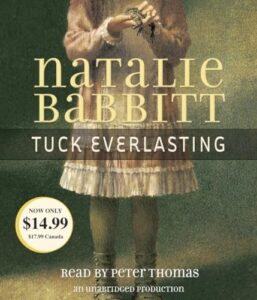
Natalie Babbitt conceived of the idea for her now-classic 1975 novel, Tuck Everlasting, from her four-year-old daughter. The girl was afraid of dying, so Babbitt wrote a story for young readers that faced death head-on. In it, young Winnie Foster comes to know a family, the Tucks, who have been granted the seemingly enviable but actually burdensome miracle of immortality after unknowingly drinking from a magical spring in the further reaches of their family’s property.
What a completely enjoyable book! It is a Young Adult book; a very easy read. Winnie, at ten, is faced with the consequences of drinking from the spring and never aging a moment or letting her natural life progress. The wise Tuck family advises her to wait until she is 17 or older to make this decision and admonishes her never to tell anyone about the spring. Knowledge of the spring could certainly wreak havoc among the people. It is actually an important and valuable concept to consider for all of us adults (and children) who are reading this in our armchairs.
I missed this book completely years ago. It is listed on the “100 Best Fantasy Novels of All Time,” A New York Time’s publication that has informed a reasonable portion of what I have read these last few years.
If you have an afternoon to sit with a cup of tea, your feet curled under you, read this. It won’t take you long. It will make you think. And it will delight you with excellent writing along the way.
June 2024
Robert Parker
Fiction 2011 | 336 pages
![]()
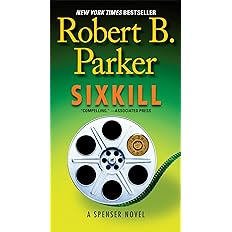
I thought I would read the last book Robert Parker wrote, Sixkill, which is in the Spenser series, as a tribute to Parker ... well, and to Spenser, too. There is no premonition, no veiled hint of his impending death. He died of a heart attack in 2010, sitting at his desk, writing his customary five pages per day. He was otherwise in good health at 77 when he died.
Zebulon Sixkill is a very large Native American, the bodyguard to bad-boy actor Jumbo Nelson, who has been accused of rape and murder. Spenser's job is to discover what really happened. Spenser takes Z under his wing because, while big, he does not know anything about how to fight. Some reviewers thought Z might be a new character in the Spenser series, but if so, he has been silenced by Robert Parker's death.
There are some really nice moments between Spenser and his main and only squeeze Susan. I recommend Sixkill to Parker fans. And now, I am complete with rereading Parker's Spenser series, and am bypassing my beloved Boston ... until another excellent Boston-based novel appears.
June 2024
Niall Williams
Fiction 2019/ 380 pages
![]()
Sometimes a simple, dated story can be completely delightful! This is the story of Faha, Ireland, a small rural town, in which the winter rains finally stop after months of grey, dampness and wet. The first telephone arrives and then, god forbid, "the electricity" arrives. The town is divided on whether or not they want to modernize to "the electricity" but once it is in, the Fahaens stridently object to 100-watt lightbulbs. These bright and sudden disturbances reveal cobwebs have been hidden in the corners, help us learn that a woman with a gorgeous ruddy in fact uses red-colored makeup, and reveals to all that the resident with a handsome head of hair despite his advancing years, does in fact, wear a wig.
We follow Noe, who is seventeen as the book opens and coming of age, living with his revered grandpa Ganga and grandmother Doady, after leaving one year in the seminary. Christy is hired as the "electric man" to bring the town and the county up to speed and becomes a lodger in Ganga and Doady's home. Christy and Noe, though about 50 years apart, become fast friends and drinking buddies.
Soon we learn that Christy didn't really come to Faha primarily to ensure that the electricity was installed, but he came to seek out Annie, whom he left standing at the altar 50 years ago. He wants to seek her forgiveness, and Noe becomes engaged in facilitating their meeting and talking. Noe himself falls in love with all three of Dr. Troy's daughters and has his first kisses.
I really enjoyed this book when it was about electricity and the cessation of rain, but once it shifted to Christy's love interest (and Noe's first love, Sophie Troy), somehow it became boring. I struggled through the long second half. Williams' writing and use of palpable mature delicious words, saved this book from being two hearts and three hearts won out. Nevertheless, I don't recommend it.
June 2024
David Grann
Nonfiction 2017/ 362 pages
![]()
"In the 1920's the richest people per capita in the world were members of the Osage Indian Nation in Oklahoma." (Back cover)
After oil was discovered beneath their land (and was specifically and surprisingly excluded from the contract the Indian Nations had with the US government) the Osage built mansions, educated their children anywhere in the world they wished, and were driven around in fancy automobiles. By any standards, this Nation had come into extraordinary amounts of money delivered by the slimy black substance beneath their dry land.
And then, members of the Osage Nation began to be murdered. At least 24 were murdered in a few short years, through guns, poison, tampered cars, and in one case, a devastating house explosion. (Current researchers and scholars believe this number is woefully inadequate and that there may have been scores, even hundreds, of murders.) As this blight was visited upon this remote part of Oklahoma, many of the dead were related to one another in this relatively small community. And, bit by bit, land and untold fortunes changed hands.
In the same time frame, the FBI was being formed and was led by J. Edgar Hoover, who attempted to ferret out the murderers from his office in Washington D C.
The information, painstakingly researched by Grann, is astounding. The majority of the book puts names, faces, history, and connections to the Indians (their word then) who were murdered and the family members who suffered as a result, emotionally, physically, psychologically, and financially. I found the formation of the FBI and the identification of the investigators who traveled to Oklahoma to search for answers a bit boring, and this section moved my rating of Killers of the Flower Moon from four hearts to three.
What is shocking is how this critical, important, and essential part of our history was not (is not?) taught in our schools. How could we (I?) not know about this blight upon our country? It is important to learn of this time and to read this book. Not a page-turning novel, but a true and accurate account of a truly devastating time in our history as a nation.
June 2024
Christine Reed
Nonfiction 2021/ 265 pages
![]()
I picked up three books at the library earlier this week that were on the shelf, waiting for me. (All on the shelf under one of the few logistics I have not changed in my life .... my library card still reads "Beryl Rullman"). Though I only read about ten pages in Jane Eyre and in A Little Life, neither spoke to me right now. They simply didn't feel like what I was wanting to partake of. So, I cracked the spine on Alone in Wonderland, the current read in my "Solo Female Adventures" Facebook group, and was immediately transported to just where I wanted to be.
Christine Reed tells her true story of hiking the Wonderland Trail 93 miles around Mt. Rainer over 12 days. But this isn't just a hiking story. She intersperses it with details of her life that explain how she arrived at this trail. She is fiercely independent, searching for her strong self, surprisingly insecure, living in a black Dodge Ram van. She abandoned the Appalachian Trail while grieving her mother's death. She never was athletic or outdoorsy, nor does she have the ideal body for backpacking adventures, but still she feels called to finding herself by challenging herself in nature.
This is not the best book I have ever read, nor is she likely to go on to become a famous author, but hers is an interesting story, told with more depth and insight into her as a person than many hiking books. It is an easy read, and enjoyable.
June 2024
Jonathon Stewart
Nonfiction 2018/ 329 pages
![]()
This is the only book I found by someone who hiked the Hayduke Trail, very different from the hundreds (thousands?) written by people who hiked the Appalachian Trail and the Pacific Crest Trail. I was excited to get my hands on it!
First, the trail itself. It isn't really a trail. It is an approximately 800-mile route through the Southwest, including six National Parks. Most of it is not on existing trails, but rather you find your way through guides, maps, tales others tell. Not many hikers are known to have hiked the Hayduke (but the numbers do include two of my favorite hikers, Carrot Quinn and Erin Saver - Wired). I can't find an accurate number of people who are believed to have hiked the Hayduke, but in 2019 some research was done by checking trail registers and permits, and the number then was believed to be about 40 hikers. So now, what, 200 hikers perhaps? A common phrase among Hayduke hikers is "figure it out." Probably no two hikers have followed the same route. There are challenges for getting up canyons, across washes, around waterfalls.
Named after George Washington Hayduke III, a fictional character in Edward Abbey's novel The Monkey Wrench Gang, the trail seeks to pay homage to Abbey for his tireless defense of these fragile and threatened public lands.
Though I loved this book, I must give it three hearts because I think many of my blog readers will not be enamored of it. You must be a diehard fan of the Southwest geography and history to really enjoy Stewart's story, and be fascinated by ancestral Puebloans, red rock spires, deep rocky canyons, lizards, constant searches for water, the desert in all its glory and threats, box canyons, bitterbrush, ruins, extreme heat and cold, pour offs, and descriptions of ancient stone formation.
In addition to navigating a route, and in tribute to Abbey, Stewart mixes in many topics, which some readers may find fascinating. The environment; the history of land preservation; water; uranium mining and contamination; climate and climate change; stock management of public and private lands; society's values; politics; endangered species; ATVs; guns; the role the Mormons played in "settling" the west; gates and locks and signs and barbed wire are all fair game in Plateau of Doubt.
The editing is atrocious. Misspellings, missed words, repeated words. I decided to include this comment in my post when, on page 175, three glaring errors (on one page!) offended my eyes. So, you must possess a high tolerance of errors such as these to enjoy this book..
All told, I can recommend this book to those who would be fascinated by hiking and a deep exploration of the geography of America's Southwest.
May 2024
Jodie Picoult & Jennifer Finney Boylan
Fiction 2023 | 480 pages
![]()
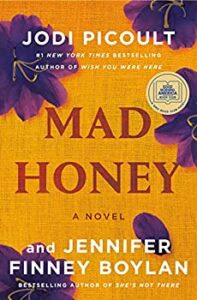
The first however-many pages of Mad Honey were all about beekeeping, as presented by the beekeeper Olivia, and were mesmerizing. As always, Jodi Picoult did her extraordinary research.
Then, we transition. Lily is found dead (murdered?) by her boyfriend Asher, both high school seniors. Lily, Asher, and Asher's mom, Olivia, are the major characters in this mystery. Told in the first person, each chapter is in Olivia's voice or Lily's voice. The tale moves back and forth in time but is quite easy to follow. At the beginning of each chapter, we learn who is speaking, the date that person is speaking, and how many days, weeks, or months it is before or after the day Lily died, December 7, 2018.
Superbly written, we learn about love, friendship, abuse, transgender journeys, loyalty, secrets, passion. Much of the book covers Asher's trial who, at age 18, is tried as an adult for first degree murder. He is represented in court by his uncle Jordan, Olivia's older brother.
I am in awe at how seamlessly Picoult moves back and forth in time to create a coherent story. And her character development is rich! We learn about these three characters' pasts, their present lives, their feelings, their thoughts and how they think. We truly get to know them as people.
I must highly recommend Mad Honey and am very grateful to Marian for recommending this book for book club. I regret I will miss our book club discussion!
May 2024
Hernan Diaz
Fiction 2023/ 416 pages
![]()
Goodness, this is a challenging book. Goodreads readers gave it a 3.84 ... quite low. Mixed reviews, for certain. I loved Diaz' writing. I thought it was eloquent and it pulled me in and through this unusual novel.
Trust is written as four novellas, or short stories. The topic is a brilliant financier in the early 20th century, and his management of money before and during the Great Depression. Andrew Bevel is our financier, though he is named Benjamin Trask in the first section. All four sections are also an interesting commentary on economics, government, and big business.
It takes a lot to make sense of the interconnections among the four sections, but I will give the structure here to help you read this book. The first section, a novel, is titled Bonds and it is allegedly a novel that Harold Vanner has written about Andrew Bevel, his life, his financial brilliance, and his quiet, tragic wife, Mildred (renamed Helen in the Vanner novel).
The second section, a memoir, is My Life, which is Bevel's telling of his life story. This section consists of many placeholders ... where you read that he is reminding himself to cover this topic next, or to expand on that topic later. Sentences like, "Show his pioneering spirit" and "Short, dignified account of Mildred's rapid deterioration" are frequent. Bevel's short section is disjointed and poorly written. I believe this was intentional, as it demonstrates that a financial and math wizard may not have any skills in writing (and, hence, communicating on any scale).
In the third and longest section, A Memoir, Remembered, we read about a young woman who is hired to ghostwrite Bevel's autobiography; both to tell his true story and as a rebuttal to what was written about him and his wife in the novel Bonds. We discover that Bevel is quite disconnected from his life and his inner workings and wants his ghostwriter to write much that is not actually true. Ida finds herself confused and bewildered as she attempts to draft this book from Bevel's ramblings.
The final section, Futures, is excerpts from Bevel's wife's journal.
Trust is ingeniously constructed. It is a novel about money, power, brilliance, intimacy, perception, and introversion. It is a story that immerses you, and that also provides a literary puzzle, both in how it is written, and what the truth is in Bevel's life. Its unconventionality will disrupt your understanding of what a "novel" is. This is a novel that requires you to think. Nothing about it is light or fluffy. If you are ready to engage yourself in a thoughtful analysis of economics, relationships (with self and others), and the role of literature, I suggest you read it.
I am SO looking forward to meeting my friend René for our traditional repast of guacamole made at our table and margaritas with salt rims. René suggested this book to me. I keep wondering what she will say about it.
May 2024
Gillian Flynn
Fiction 2012/ 415 pages
![]()
You have probably heard the story ... a woman, Amy, disappears on the morning of her fifth wedding anniversary to Nick. No surprise, he is investigated for her murder, though no body is found.
This is a psychological mystery. As the book progresses, through various chapters written in the voice of Nick or Amy, many of them in the past, we learn how emotionally and psychological flawed these two brilliant characters are. They destroy themselves, they destroy their marriage, they destroy the relationships that are trying to keep them safe and secure.
Flynn is a gifted, intense, genius of a writer. This book is worth reading for her writing alone. However, the story is difficult, depressing, bothersome. My man Brian talks about the movie version consisting of the stuff that sources nightmares. Amy is very destructive and scary.
I cannot tell you whether to read Gone Girl or not. It is the second time I read it, as it kept coming up in conversation. I am not sorry I read it (again) but I am not uplifted by it.
May 2024
Lisa Jewell
Fiction 2023/ 370 pages
![]()
None of This is True opens on June 8, 2019, at a nice restaurant near London. It is Alix's 45th birthday, and she is celebrating with a crowd of her friends ... noisy and boisterous, with a lot of booze flowing. Josie is also celebrating her 45th birthday at this restaurant, but it is a quiet observance, just Josie and her husband Walter. The relationship between Josie and Alix is kick-started in the restaurant's bathroom where Josie proclaims, "Hi! I'm your Birthday Twin!" They were born on the same day in the same hospital. (My own personal coincidence is that June 8 is also the birthday of my beau Brian.) And so, a strange and unusual relationship begins.
Alix is just completing a very successful run as a podcast interviewer, featuring women who overcame obstacles and achieved or exceeded their goals. She is ready to do something else. Josie is about to make major changes in her life and wonders if Alix might want to do a podcast with someone during her transition ... not afterwards. Alix warms to the idea, and they begin regular interviews at Alix's studio in her home. And Josie maneuvers her way deeper into Alix's life.
At this point, None of This is True is a page turner. Easy and fun to read. We learn about Josie's mom, her husband Walter, who is nearly 30 years her senior, and her two grown daughters, Erin and Roxy, both of whom have cut themselves off from the family. As Josie draws Alix out, we learn also about Alix's husband Nathan, who has a habit of staying out all night, and their two younger children.
But eventually, about half-way or two-thirds through, the book turns dark. As Josie's interviews become more and more personal, we learn she is psychotic, a kleptomaniac, violent, and a perpetual liar. I found the book harder and harder to read as I progressed through the latter pages, because it turned so dark. And the ending is filled with murders.
I cannot for a moment fault Lisa Jewell's writing. She is a superb writer, with intensely developed characters and, it seems, tight and engaging plot lines. I am going to pick another one of her books to read.
The disturbing nature of her main character leaves my stomach a bit upset and knocked me down from four hearts to three. Read this mystery if you have a tougher heart right now than I have.
April 2024
James McBride
Fiction 2023 | 400 pages
![]()
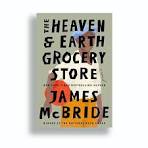
What a rich book this is! The characters have purpose, meaning, and personality. The setting is the small town of Pottstown, Pennsylvania, in the late 1920's and 1930's. This is a time and a town where Jews, Negroes, and White Christians led lives, isolated in their cultural groups, and yet thrown together by circumstance. This is a time of discrimination, assumption, bigotry.
Our main characters are Chona and Moshe, a Jewish married couple. Chona is the kindest, most generous woman you'd want to meet. She runs the Heaven and Earth Grocery store, and cares also for the second floor, which is where Chona and Moshe live. She treats Jews, Negroes, and Christians alike, with the same compassion and fairness. She lets her neighbors buy on credit, which is seldom repaid. She lets the children buy candy with marbles, which rotate through the community of Pottstown, and the same marble purchases multiple bits of candy over time. The Grocery is always in the red. Moshe, quiet and self-contained, who runs two theaters in town, as well as creating income from other sources, introduces the music of these multiple cultures to the residents of Pottstown, and, in his own way, does his part to break down cultural barriers and build understanding and respect.
Chona becomes very ill, which plays a large part in this book. They also take DoDo into their home, a black hearing-impaired orphan, which serves to unite the community when the government takes him away and moves him to an asylum for lunatics. At 12 years old, Dodo is a fascinating character who has much to teach us.
There are other well developed and interesting characters in this astute book that explores race, poverty, bias, and history. McBride gives us much to ponder. Yes, I recommend this book, unequivocally.
April 2024
Heather Cocks
Fiction 2016, 496 pages
![]()
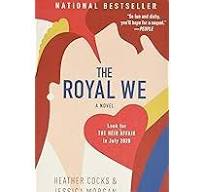
Too sweet, too saccharin. I read 100 pages to fill up some airplane time and now I am moving on.
April 2024
Emily Habeck
Fiction 2023 | 419 pages
![]()
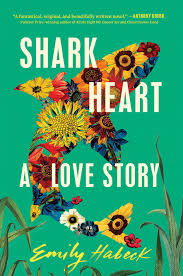
In 21 years of reading The Deschutes Public Library community read, this is the first book I didn’t care for. I may not have finished it, if it weren’t for its central place among those who read in Bend.
A first novel by Ms. Habeck, but one that didn’t touch me. A few weeks after Wren’s marriage to Lewis he is diagnosed with “Carcharodon carcharias” mutation. In nine months, he will be a great white shark. I like fantasy, mystical realism, and unbelievable premises, but this one never landed for me. We watch as Lewis and Wren deal with this terrible diagnosis and the eventual absolution of their marriage. But Wren is so analytical, I never get a feel for her feelings and Lewis is so inward-focused, he doesn’t come alive on the page either.
And the pages? Many, many, many pages are one or two sentences long; filling maybe three lines on the page. Why? What is this literary tool supposed to gain us? I don’t know.
Of course, there are many poignant moments, many quirky moments, many sad moments, many fun moments. (Lewis’s diet changes radically as his body transforms, and he consumes copious amounts of raw fish and shrimp every day!) It may stick with me because the premise it so odd, but not because I thought the writing was either insightful or profound. I suggest you skip to whatever is next on your list.
April 2024
Shannon Read
Nonfiction 2024 | 329 pages
![]()
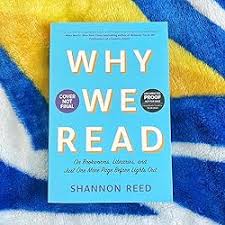
Why We Read is like a piece of excellent flourless chocolate cake. Truly yummy! Shannon Reed has had a love affair with books since she was two, when her Mum-Mum taught her how to read, because she "was ready." She taught literature to high school and college students and is now a professor in creative writing at the University of Pittsburgh. And she loves to read!
Her book is delightful. Each short chapter focuses on a different aspect of reading, such as why we read series, reading for comfort, how we choose a book to read, reading because we have to, reading to feel superior, reading because it is fun. It is quite an experience for the reader, as we recognize ourselves in some chapters, and not in others. The entire premise of the book is captured in its title, Why We Read.
Reed has inspired me to reread Jane Eyre and Gone Girl. She introduced me to The Royal We, and invited the to reconsider reading my favorite series, Robert Parker's Spenser novels and/or Outlander.
She is a good humor writer, too.
Watch out book club! I will suggest this book for 2025, unless too any of us have read it by then!
If you love to read, you will love Why We Read?
April 2024
Nita Prose
Fiction 2002/ 307 pages
![]()
(Note: To begin with a clarification, this is not The Maid, written by Stephanie Land in the same time frame, with a movie and a Netflix series to its credit. That is a book about domestic violence and a woman making it on her own. This book, also titled The Maid, is a murder mystery set at the Grand Hotel in England.)
Our main character is Molly Gray, an exemplary maid in the hotel, with a quirky sense of perfection. Cleaning is her calling in life. When Molly finds a frequent well-to-do guest, Mr. Black, dead in his suite, things turn quickly awry as Molly is accused of and arrested on drug charges, possession of an unregistered gun, and the murder of Mr. Black himself. We follow her through one week in her life; the week when her life falls apart. It seems Molly has been inadvertently used as a pawn in a drug ring being run out of this fine hotel.
Molly lives alone in a slumlord's apartment building. Her Gran, who taught Molly with an insatiable number of cliches and a firm sense of morality, shared an apartment with Molly, and just died just a few months prior. Molly has/had no life of her own, other than The Grand Hotel and her Gran.
The story is fun and an easy read. The “whodunit” is revealed very near the end, and it wasn’t a surprise to me. Was it a surprise to you?
Molly is the most naive character I believe I have ever read about in a book. This trait, central to the theme and story line, is sometimes entertaining, but often simply frustrating to the reader. As such, I can’t quite recommend The Maid. However, if you are seeking a mystery read that is just pure fun, this is a good choice.
April 2024
Claire Keegan
Fiction 2007/ 128 pages
![]()
I believe I may simply be tiring of short stories ... not my favorite genre. But Walk the Blue Fields did not grab me as much as Claire Keegan's other books. The opening short story was disturbing. If she had carried that theme throughout, I might have been more compelled. Other stories were mixed ... some light, some heavy. And one short story was in another book. Don't take me too seriously; I probably just need a Keegan break!
March 2024
Lauren Fleshman
Nonfiction Autobiography 2023 | 274 pages
![]()

I am a feminist, not naive, was a bit of an athlete in my earlier years, and I know something about women's health.
In the first 50 pages of Good for a Girl, I leaned many things I didn't know ... about how the changes in our body effects our physical performance; about the deeply challenging and disturbing studies and insights into eating disorders; about gender equity in sports. Lauren Fleshman taught me.
And then she continues to do so for another 200 pages as we walk with her (she is running; we are walking!) through the changes and challenges in her body and in sports culture over the next 20 years or so. And trust me, the changes have still not been all that profound. We witness her ... no, we FEEL her win races, lose races, become injured, develop negative self-talk, regain her confidence, fight battles, over and over. She races throughout the world ... and develops many relationships with teammates, mentors, and coaches. If you think women who compete with each other can't be friends, read this book! Women who compete with each can be a wildly supportive network.
I was reading this at first because of my connection. Lauren is the daughter-in-law of one of my friends, and I had the privilege of hosting Lauren and Jesse for a short while in my Opportunity Knocks group as they were building Picky Bars. But it didn't me long to realize, this is a well written, educational, mind-and-heart grabbing autobiography.
Every woman will likely learn and benefit from reading this book. Parents of aspiring female athletes (and the athletes themselves) should read this book. It needs to be required reading for all sports coaches, before they apply to get the job! And a lot of men will find it fascinating too, especially if there are active women in their lives whom they love. I sincerely recommend Good for a Girl.
March 2024
Claire Keegan
Fiction 2021 | 118 pages
![]()
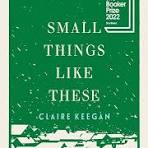
Sometimes a man works hard at his job and provides for his family (five daughters, one wife!) whom he loves. And these two endeavors sometimes become not enough. Bill Furlong reaches that stage, though I am unsure he recognizes it. Instead he feels a bit out of sorts, restless, a bit of a wanderer. But by the end of this novella, he finds what is calling him and what he needs to feed his soul and set him upon his next path.
Another beautiful Claire Keegan discovery of a character, who she makes so very real for us with superb writing.
March 2024
Carrot Quinn
Nonfiction 2015/ 368 pages
![]()
I have commented in other blog posts that I am a sucker for real-life-wilderness books. This one is superb! The manner in which adventurers on long-haul trails, whether on land, on water, or on ice, share themselves with us, the great unknown, is very pleasing. They are typically not authors, but instead are simply opening their hearts and souls to us. Carrot Quinn is one such writer. (Around page 100 I finally googled Carrot because I didn't know for certain if he was a he or she was a she. She is a woman!)
Carrot sets out to hike the Pacific Crest Trail, from Mexico north to Canada. And her message is clean. She doesn't fill this book with her life history and what inspired her to load up and put on a heavy backpack. She doesn't spend a lot of time studying maps and books. She is not filled with angst like Cheryl Strayed when she began the same journey. She has the basics that support her ... a PCT trail map and imperatively, a GPS listing and description, mile by mile, of water spots, whether springs, a trough, a cache, or a hotel/hostel/store. We know these foundational tools support her, but Thru-Hiking Will Break Your Heart does not dwell on logistics, but rather on Carrot's feelings, moods, insights, thoughts ...
Hmm, I haven't read a book on hiking the CDT (Continental Divide Trail), nor the trail I really want to learn about, The Hayduke. (Update .... I found one book on each! They are now in my possession).
Carrot meets other hikers on the trail and spends many of her days hiking with them. They are fun and interesting. Sometimes Carrot camps alone; this cab make her uncomfortable. It was a low-snow year in the Sierras the year she hiked the PCT (2013), so it was more about walking than post-holing. Finding and hauling and imbibing enough water and food through any section is a constant focus for her and her co-trail-hikers. The number and variety of Trail Angels astounds me. Thank goodness for Trail Angels!
At the last minute I changed my rating from four hearts to three, not because I didn't love this book, but because it will appeal to a unique audience which is what my three hearts stand for. It is a bit long. However, if you love wilderness adventures as I do, I fully recommend this real-life tale by Carrot Quinn.
March 2024
Shelley Blanton-Stroud
Fiction 2023 | 256 pages
![]()
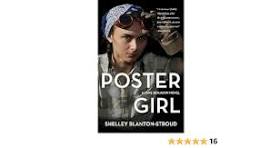
Speaking of falling in love with an author (seeing my last blog post!) I have also fallen in love with Shelley Blanton-Stroud, author of Copy Boy, Tomboy, and Poster Girl.
Our hero, Jane Benjamin, has worked her way up to be gossip columnist for The Prospect, a San Francisco-based newspaper, in 1942. But, as in her first two novels, Benjamin finds herself in the middle of real stories, not the stuff gossip is made of. Covering seven days in November 1942, the novel opens with Jane attending a celebration for the first women welders hired and trained by Lowe Shipyards, a west coast shipbuilder, who is a leader among the shipbuilders in the competitive shipbuilding market as the United States enters WWII. But one of the four new welders is missing from the celebration, and we soon find her dead, apparently from a faulty welding cable. Jane is thrown into the mystery of her death, which is handled and investigated totally by internal Rowe employees, as well as the political and cultural struggle to bring women into patriotic, economic, and physical support of the war.
As with her first two novels in the Jane Benjamin series, Blanton-Stroud has created smart, scrappy, satisfying women’s history. Poster Girl is an absorbing mystery and a fascinating historical fiction story. As with her previous novels, we learn that Jane Benjamin is flawed, over-zealous, ambitious, has no filter on her mouth, and among the most lovable characters you will find. I just love this new author. I can find nowhere on her site that she has another novel in the works. I sure hope so!
I whole-heartedly recommend Poster Girl. I suggest you read her three novels in the Jane Benjamin series in order. While Blanton-Stroud does fill in all the information you need to know, I find it quite intriguing to watch Jane Benjamin grow and change, and to understand from whence she came.
March 2024
Claire Keegan
Fiction 2023 | 128 pages
![]()
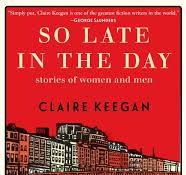
Sharp. Crisp. Wounded. Insightful. These are words that come to mind when I think of how Claire Keegan develops her characters. How can she make you comprehend an important essence of a character in 20, 30, 40 small pages? I don't quite understand it, but I love it. Her writing is astounding! I am not a fan of short stories, and yet the three short stories that comprise So Late in the Day are profoundly related to each other. They grab you, and do not let go. She tells the stories of what goes wrong between men and women, from a place of deep insight, not surface behavior (especially, she portrays the men and their psychological weaknesses).
Take an hour or two and read this short book. Keegan has nine books, most of them about 100 pages long, and you will see more blog posts from me on this author in the next few months. It is wonderful to fall in love with an author!
March 2024
Elaine Sandberg
Nonfiction 2007/ 124 pages
![]()
A Beginner's Guide to American Mah Jongg by Elaine Sandberg, filled with graphics, color, exercises, humor, and extremely clear explanations, is simply delightful. I believe you could learn the game by just reading this easy 124 page book.
I own this book and it is available for loan.
March 2024
Andrew Doughty
Nonfiction
![]()
I just read three books on Hawaii, as we plan for our trip to the Big Island. Hawaii The Big Island Revealed by Andrew Doughty is a real gem. Doughty, who lives in Hawaii, won't recommend someplace in his book until he has been then, often a few times. It feels up-to-date and clear, and it is as though you are in conversation with hm. We expect this to be our go-to book.
Hawaii, The Best Beaches on the Big Island by Robert Frutos, is a sweet and short book. But it fulfills for us just what we wanted fulfilled. It markets itself with this description ... "including the very best snorkeling locations." A good reference if snorkeling is your thing.
Wind, Wings and Waves by Rick Soehren is a nature guide to Hawaii. It covers nature, geography, volcanoes, culture, plants, animals and coral reefs across all of Hawaii. Because he includes the islands of Kaua'i, O'ahu, Maui, Moloka'i, Lana'i, and the Big Island, it is more of a reference guide than a tourist guide. This book will probably stay home when we travel.
Just in case someone else out there needs these books!!
March 2024
Lynda Rutledge
Historical Fiction 2021 | 355 pages
![]()
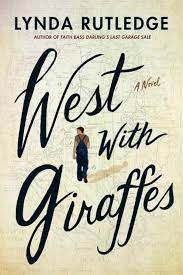
The story is narrated by Woodrow Wilson Nickel, a fictional character. When the story opens, he is 105, and being the age he is, he wishes to write of the experience of a lifetime, one he had when he was only seventeen.
Inspired by true events, the tale weaves real-life figures with fictional ones, including the world's first female zoo director, at the San Diego Zoo. Two giraffes, named Boy and Girl, travel from Europe on a ship in 1938, and as they enter New York harbor, so does a hurricane. West with Giraffes is the story of Woody Nickel who, having lost both his parents and his baby sister in the Dust Bowl in the Texas Panhandle, has traveled east to find Cuz, the boss of his third cousin. He sees at the harbor these two giraffes, barely alive, and manages to finagle his way to sign on with Old Man to help drive Boy and Girl to San Diego. And the adventures begin.
The story line is awesome; the connection to truth is intriguing. There were moments I couldn't wait to turn the page, and many other moments I was simply bored. The writing was very inconsistent to me. I read a lot of magazines while reading West with Giraffes, because I was often drawn to distractions, so I could put the book down.
One problem I had is I could not picture the rig, which made virtually every scene rather foggy. Rutledge was much better at telling the story than showing the story ... a writer's curse of death. I finally looked this up on google and found about a half-dozen photos of rigs, all decidedly different, all carrying two giraffes each. These photos gave me a better feel for what they may have been traveling in and wiped away a bit of the fog.
One reviewer wrote that the sentences were passive. Even once I read this, I couldn't pick out passive sentences, but I had the feeling there was a dampening of the story, like the reader had on headphones or was under water.
Another reviewer writes:
"Woody drives for a while.
They stop so the giraffes can eat.
They run into road trouble.
Red is following them and takes pictures.
They solve their trouble.
They stop for the night.
Repeat the same sequence tomorrow, and the next day."
I think she hit the nail on the head.
I do not know quite how to explain this ... it is something we talk about in coaching ... putting a lid on it. I felt the whole time that there was a lid on this story, holding the energy down and trapping it inside. If she had had fewer crises (instead of one every day) but let them explode ... be deeper, bigger, more interesting, more filled with action and emotion (I SO wanted to know more about the seven Black brothers and the big family's granddaughter) ... the story would have been more compelling. If she had explored Old Man or Red in greater depth, instead of being obsessed with their secrets, we might have discovered more about who they are, what they felt, even their histories, about which we knew nothing, the story would have been more compelling. We only came to know one coming-of-age character, Woodrow Wilson Nickel, and that was not enough.
Two members of my book club recommended West with Giraffes for our March read. I will be fascinated to hear what they have to say. In the meantime, I don’t recommend this book. Guess I will return to my magazines now.
February 2024
Michael Finkel
Nonfiction 2023/ 225 pages
![]()
Stéphane Breitwieser, along with his girlfriend Anne-Catherine, is believed to be the most prolific art thief of all time, conducting 239 heists, typically in broad daylight, from 172 museums, and amassing $2 billion in art works. Different from most (all?) other art thieves, during his heyday, he never sold or attempted to sell a single piece of work. He stole them for their artistic beauty and displayed them all in the attic bedroom and salon he shared with Anne-Catherine. Check out this book if for no other reason than to see the drawing of these two rooms. He was obsessed with the beauty of exquisitely completed art, much of it from the Renaissance period, and all from a wife wide range of media ... painting, sculpture, ivory, metal chalices, wood, weapons ... a large and diverse range. His thieving eventually transforms from love to compulsion to obsession to maniacal.
And his story is absolutely true. This is a "true crime" book. For that reason, it deserves a read.
However (I know, it has been weeks since I did not give a book four hearts) I found it poorly written. It reads like a spreadsheet to me. He stole this piece, from this museum or show or gallery, by removing 4 or 8 or 30 screws or two locks and stashed it under his jacket or his backpack or Anne-Catherine's large purse, and walked out of the building in the middle of the day, often chatting with a guard or patron. This pattern repeats itself through the book, without much interlude.
Do I recommend The Art Thief? Mildly. The story is interesting, but I will be curious to hear/remember why my book club selected this short read. It just didn't quite woo me.
February 2024
Abraham Verghese
Fiction 2023 | 725 pages
![]()
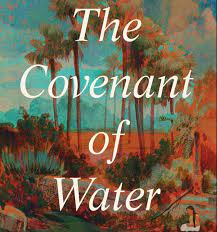
I picked it up at the library, and then took it back unread. Then I did it again. And then a third time. I was intimidated by the length (900 pages large print; 725 regular print). But this last time, I committed and read it through. What a profound, delightful, meaningful, engaging, powerful, interesting book. (it took me 19 days to read).
We begin in 1900 and follow a family for three generations and across two continents, until Ammachi's granddaughter makes some astounding discoveries at the end of the book, in 1977. We learn early on about "The Condition," so named by Ammachi, the 12-year-old Indian girl who is forced into an arranged marriage and who eventually becomes the beloved matriarch of this family. She notices, as does the generation before her, that in every generation, someone dies from drowning. The drowners also hate the water, and refuse to go near it all of their lives, from fussing under the baptismal font until their final accidental encounter with water.
But soon the book becomes not only about the family, but about land, and the caste system in India, and land growth and development, and leprosy, and advances in the medical field as well as in cultural and social norms. There is a section near the end about the Indian caste revolution and the democratic election of a Communist government.
The family is complex, with their "secrets" like any family and generations-old relationships both within the family itself and the lower caste that serves them and their land.
Verghese is a doctor who decided mid-career to train at the Iowa Writers’ Workshop, and has gone on to achieve distinction in both fields. You will enjoy his considerable medical knowledge as well as his very engaging characters and story development.
I must recommend this tome ... it is destined to be a classic. AND, know that snow days or beach days will help you navigate the length, complexity, and depth of The Covenant of Water. Please post your thoughts and reactions here. I will be eager to read what you think about this delightful book.
February 2024
Heather Morris
Historical Fiction 2018 | 288 pages
![]()
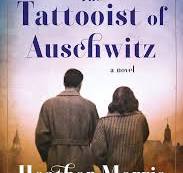
This short book is another gem ... only this is one everyone SHOULD read, not only might enjoy reading!
The Tattooist of Auschwitz is a story of a young Slovakian Jew named Lale Sokolov who was taken from his home to save his family in 1942, and transported to Auschwitz-Birkenau, a German Nazi concentration and extermination camp, in Poland. While there, he worked as the camp tattooist (Tätowierer) and fell in love with a Slovakian Jewish girl named Gita Furman. She saw no reason to get to know him, initially. To her, "they were never going to leave that place, other than through the chimney." But they did and after the war, the lovers found each again, and were married for 58 years.
As such, the book depicts not only the nightmarish wartime reality, violence, humiliation, degradation, starvation, murder, and completely inhumane day-to-day life at a concentration camp but also describes a love story that survives despite the enormous difficulties.
For many years, this history was known only to the closest family of Lale and Gita. Lale was simply afraid to discuss his past so as not to be accused of collaborating with the Germans. Only after the death of his beloved Gita in 2003, when he first met the writer Heather Morris, did Lale decide to tell Heather about everything that had happened during the war.
Claims of factual inaccuracies have been made by the Auschwitz Memorial Research Center. For example, they say that a tattooist never had this role as his job. The assignment at tattooists was more random and short-term than represented in the book. Somehow, I don't find it necessary to ferret out truth from fiction in "historical fiction." If there is a core element of truth, with attempted research behind it, and the book raises my awareness about a time period or an event, I consider myself well-served.
I heartily recommend this book. It is insightful, yet hopeful.
February 2024
Shelley Blanton-Stroud
Fiction 2020 | 309 pages
![]()
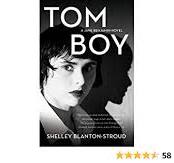
Tomboy is an excellent sequel to Shelley Blanton-Stroud's first novel, Copy Boy. In Tomboy, Jane Benjamin reverts to her rightful gender, female. She has been accepted at her SanFrancisco- based newspaper, the Prospect, in a low-level cub reporter role, but, still, as a young woman during the Depression Era.
Through a series of flukes, Jane gets herself on a trip to report on a female tennis star at Wimbledon, which proves to be more than Jane bargained for when the tennis star’s coach drops dead at the game. On the trip back across the Atlantic, more questions arise, and Jane soon finds herself researching another mystery. She wants to be a gossip columnist but keeps running into real news to write about!
I loved the way the author handles Jane's trip across the sea to England, and back again, on the RMS Queen Mary. Each chapter opens with the deck of the Queen Mary that is the setting for the chapter, and it is fascinating to watch the workings of the ship, as well as Jane and the hardships she encounters. I swear, I could feel the rocking of the great ship. Jane is befriended by the tennis star, Tommie, and their relationship is complex. They serve as mirrors to each other, right down to what shoes they wear.
Jane is not an easy-to-love character. She lies, steals, and uses people. She is irresponsible and selfish; naive and moody. And yet, because she sees clearly who she is and begins to admit it to herself, she is endearing and you root for her. She is also feisty, ambitious, resourceful, and determined. In the end, she does her best to not hurt people.
I urge you to climb aboard the lively Blanton-Stroud train. A friend of a friend, the author recently retired from teaching writing at Sacramento State. She is a mature writer, even in this, her second novel. I am at the edge of my seat, awaiting the third novel, The Poster Girl. RECOMMENDED!
January 2024
Keegan Claire Keegan
Fiction 2010 | 95 pages
![]()
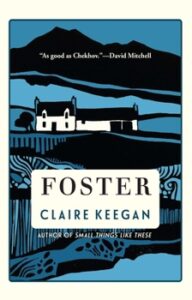
Now I understand why everyone says, “I didn’t want this book to end….”
An unnamed girl is given to her aunt and uncle for a few weeks of fostering on the Irish countryside, while her mother delivers yet another baby. While this girl has few words or experiences to describe her emotions, she soon learns what love is.
This novella will take you two hours to read, and it is worth every minute.
February 2024
Claire Keegan
Fiction 2010 | 95 pages
![]()

Now I understand why everyone says, “I didn’t want this book to end….”
An unnamed girl is given to her aunt and uncle for a few weeks of fostering on the Irish countryside, while her mother delivers yet another baby. While this girl has few words or experiences to describe her emotions, she soon learns what love is.
This novella will take you two hours to read, and it is worth every minute.
January 2024
p.s. Published twice because this doesn't seem to have gone to the mailing list. My apologies if you receive twice!
Sonia Purnell
Biography 2019 | 368 pages
![]()

You can't read this like a fiction book. There is no skimming! Every single paragraph has an important piece of information in it. I have returned to reread many a paragraph when my mind wanders. I am not certain I have ever read a book so deep and intense in its research, and resultant writing.
A Woman of No Importance is a captivating biography that unveils the extraordinary life of Virginia Hall, an American spy during World War II. Purnell skillfully narrates Hall's courage, resilience, and contributions to France, offering a compelling and inspiring story of a woman who utterly defied expectations in a male-dominated field. The book sheds light on a lesser-known hero and provides a gripping account of espionage and bravery. (This last paragraph written by Chat GPT, edited some by me. Thought I would try an experiment. While factually accurate, it just doesn't sound like my voice, does it?)
Virginia Hall amazes me. She gathered, committed, and outfitted resistors to the Germans. She created safe houses and received secret packages of food, clothing, supplies, and cash for the men and women she recruited. She planned safe routes, actions to sabotage the movement of Germans through blowing up bridges, destruction of roads, etc. She planned and helped resistors escape from jails, prisons, and concentration camps. She learned to "play the piano" of a radio which allowed her to pass on information to her "bosses" in London. Perhaps most important of all, she created and maintained relationships with everyone from royalty to power brokers to brothel owners to clergy which allowed people with certain values and beliefs about peace, freedom, and courage, to direct their energy, do something useful, and in many cases put their lives on the line, saving their beloved country (Virginia's adopted country) of France. She did all this with no guidance, no mentors, no training, no experience, no advice and counsel. She relied solely on her wisdom, her own thought processes, her natural skills, her amazing brain, her warmth and care-taking, and her astounding strategy skills.
Some she saved from sure death wrote, "They had enjoyed nearly forty years of freedom since spending a mere couple of months in Virginia's presence in 1944. But the warrior they called La Madone had shown them hope, comradeship, courage, and the way to be the best version of themselves, and they had never forgotten." (Final page of Chapter Twelve.")
And we don't know her. She was a hero we should have studied in high school. She was the first woman to do so much, with so much strength and courage, we should have had a chapter on her in our high school history books. Just as important, I learned a great deal about the REAL war and what it was truly like to resist losing your freedom to a ruthless invader. I learned about the real people in the war, not just the politics.
Thank you, Jan Baker, for this recommendation. Although it is a bit long, I cannot help but recommend this incredibly well researched and intriguing biography to everyone.
January 2024

Review Posts
- The Story of Edgar Sawtelle July 2025
- The Bookshop at Water’s End June 2025
- The Wind-Up Bird Chronicles June 2025
- The Antidote June 2025
- The Breakthrough June 2025

